Refine search
No keyword found to refine search
keywords EN
Places
Names
2751 documents found
| 1 | 46 |
Documents per page :
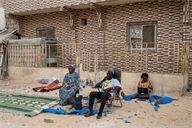
The Herds Public Art Project, Dakar, Senegal, April 25, 2025
Nicolas Réméné / Le Pictorium
LePictorium_0307485.jpg
Three people sit outside a house in a small square in the Medina district of Dakar, Senegal, on April 25, 2025.
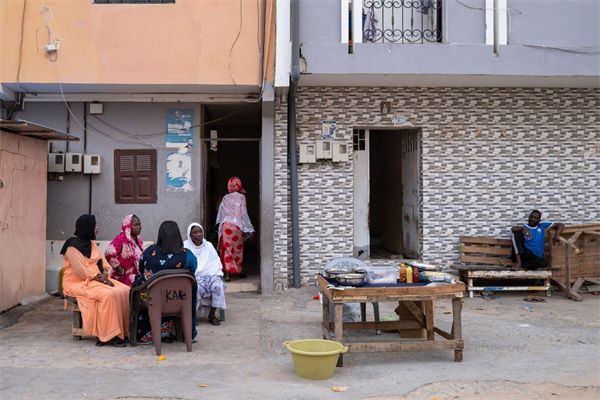
The Herds Public Art Project, Dakar, Senegal, April 25, 2025
Nicolas Réméné / Le Pictorium
LePictorium_0307486.jpg
Residents of the Medina neighborhood, including a group of women, sit outside a small building in Dakar, Senegal, on April 25, 2025.
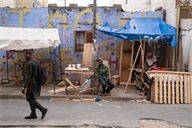
The Herds Public Art Project, Dakar, Senegal, April 25, 2025
Nicolas Réméné / Le Pictorium
LePictorium_0307487.jpg
A young apprentice carpenter laughs on a street in the Medina district of Dakar, Senegal, on April 25, 2025.
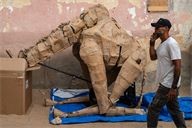
The Herds Public Art Project, Dakar, Senegal, April 25, 2025
Nicolas Réméné / Le Pictorium
LePictorium_0307488.jpg
Puppeteer artists from the new public art project The Herds prepare to parade life-size wild animal puppets through the streets of Dakar's Medina district on April 25, 2025. The puppets for THE HERDS, designed by Ukwanda Puppets and Designs Art Collective, interact with the public during live performances intended to raise awareness about the effects of climate change. A 20,000 km journey between the Congo Basin and the Arctic Circle that will cross more than a dozen countries for nearly 4 months.
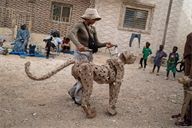
The Herds Public Art Project, Dakar, Senegal, April 25, 2025
Nicolas Réméné / Le Pictorium
LePictorium_0307489.jpg
Puppeteer artists from the new public art project The Herds prepare to parade life-size wild animal puppets through the streets of Dakar's Medina district on April 25, 2025. The puppets for THE HERDS, designed by Ukwanda Puppets and Designs Art Collective, interact with the public during live performances intended to raise awareness about the effects of climate change. A 20,000 km journey between the Congo Basin and the Arctic Circle that will cross more than a dozen countries for nearly 4 months.
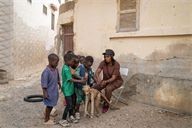
The Herds Public Art Project, Dakar, Senegal, April 25, 2025
Nicolas Réméné / Le Pictorium
LePictorium_0307490.jpg
Puppeteer artists from the new public art project The Herds prepare to parade life-size wild animal puppets through the streets of Dakar's Medina district on April 25, 2025. The puppets for THE HERDS, designed by Ukwanda Puppets and Designs Art Collective, interact with the public during live performances intended to raise awareness about the effects of climate change. A 20,000 km journey between the Congo Basin and the Arctic Circle that will cross more than a dozen countries for nearly 4 months.
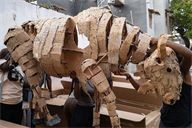
The Herds Public Art Project, Dakar, Senegal, April 25, 2025
Nicolas Réméné / Le Pictorium
LePictorium_0307491.jpg
Puppeteer artists from the new public art project The Herds prepare to parade life-size wild animal puppets through the streets of Dakar's Medina district on April 25, 2025. The puppets for THE HERDS, designed by Ukwanda Puppets and Designs Art Collective, interact with the public during live performances intended to raise awareness about the effects of climate change. A 20,000 km journey between the Congo Basin and the Arctic Circle that will cross more than a dozen countries for nearly 4 months.
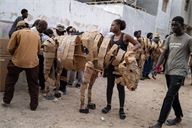
The Herds Public Art Project, Dakar, Senegal, April 25, 2025
Nicolas Réméné / Le Pictorium
LePictorium_0307492.jpg
Puppeteer artists from the new public art project The Herds prepare to parade life-size wild animal puppets through the streets of Dakar's Medina district on April 25, 2025. The puppets for THE HERDS, designed by Ukwanda Puppets and Designs Art Collective, interact with the public during live performances intended to raise awareness about the effects of climate change. A 20,000 km journey between the Congo Basin and the Arctic Circle that will cross more than a dozen countries for nearly 4 months.
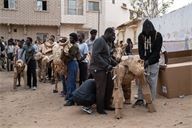
The Herds Public Art Project, Dakar, Senegal, April 25, 2025
Nicolas Réméné / Le Pictorium
LePictorium_0307493.jpg
Puppeteer artists from the new public art project The Herds prepare to parade life-size wild animal puppets through the streets of Dakar's Medina district on April 25, 2025. The puppets for THE HERDS, designed by Ukwanda Puppets and Designs Art Collective, interact with the public during live performances intended to raise awareness about the effects of climate change. A 20,000 km journey between the Congo Basin and the Arctic Circle that will cross more than a dozen countries for nearly 4 months.
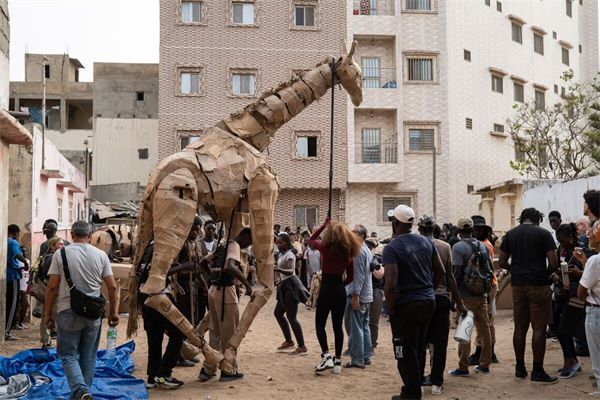
The Herds Public Art Project, Dakar, Senegal, April 25, 2025
Nicolas Réméné / Le Pictorium
LePictorium_0307494.jpg
Puppeteer artists from the new public art project The Herds prepare to parade life-size wild animal puppets through the streets of Dakar's Medina district on April 25, 2025. The puppets for THE HERDS, designed by Ukwanda Puppets and Designs Art Collective, interact with the public during live performances intended to raise awareness about the effects of climate change. A 20,000 km journey between the Congo Basin and the Arctic Circle that will cross more than a dozen countries for nearly 4 months.

The Herds Public Art Project, Dakar, Senegal, April 25, 2025
Nicolas Réméné / Le Pictorium
LePictorium_0307495.jpg
Puppeteer artists from the new public art project The Herds prepare to parade life-size wild animal puppets through the streets of Dakar's Medina district on April 25, 2025. The puppets for THE HERDS, designed by Ukwanda Puppets and Designs Art Collective, interact with the public during live performances intended to raise awareness about the effects of climate change. A 20,000 km journey between the Congo Basin and the Arctic Circle that will cross more than a dozen countries for nearly 4 months.

The Herds Public Art Project, Dakar, Senegal, April 25, 2025
Nicolas Réméné / Le Pictorium
LePictorium_0307496.jpg
Puppeteer artists from the new public art project The Herds prepare to parade life-size wild animal puppets through the streets of Dakar's Medina district on April 25, 2025. The puppets for THE HERDS, designed by Ukwanda Puppets and Designs Art Collective, interact with the public during live performances intended to raise awareness about the effects of climate change. A 20,000 km journey between the Congo Basin and the Arctic Circle that will cross more than a dozen countries for nearly 4 months.
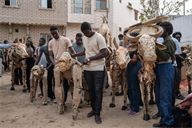
The Herds Public Art Project, Dakar, Senegal, April 25, 2025
Nicolas Réméné / Le Pictorium
LePictorium_0307497.jpg
Puppeteer artists from the new public art project The Herds prepare to parade life-size wild animal puppets through the streets of Dakar's Medina district on April 25, 2025. The puppets for THE HERDS, designed by Ukwanda Puppets and Designs Art Collective, interact with the public during live performances intended to raise awareness about the effects of climate change. A 20,000 km journey between the Congo Basin and the Arctic Circle that will cross more than a dozen countries for nearly 4 months.
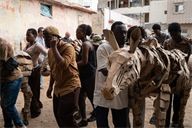
The Herds Public Art Project, Dakar, Senegal, April 25, 2025
Nicolas Réméné / Le Pictorium
LePictorium_0307498.jpg
Puppeteer artists from the new public art project The Herds prepare to parade life-size wild animal puppets through the streets of Dakar's Medina district on April 25, 2025. The puppets for THE HERDS, designed by Ukwanda Puppets and Designs Art Collective, interact with the public during live performances intended to raise awareness about the effects of climate change. A 20,000 km journey between the Congo Basin and the Arctic Circle that will cross more than a dozen countries for nearly 4 months.
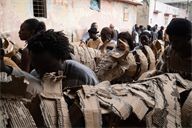
The Herds Public Art Project, Dakar, Senegal, April 25, 2025
Nicolas Réméné / Le Pictorium
LePictorium_0307499.jpg
Puppeteer artists from the new public art project The Herds prepare to parade life-size wild animal puppets through the streets of Dakar's Medina district on April 25, 2025. The puppets for THE HERDS, designed by Ukwanda Puppets and Designs Art Collective, interact with the public during live performances intended to raise awareness about the effects of climate change. A 20,000 km journey between the Congo Basin and the Arctic Circle that will cross more than a dozen countries for nearly 4 months.
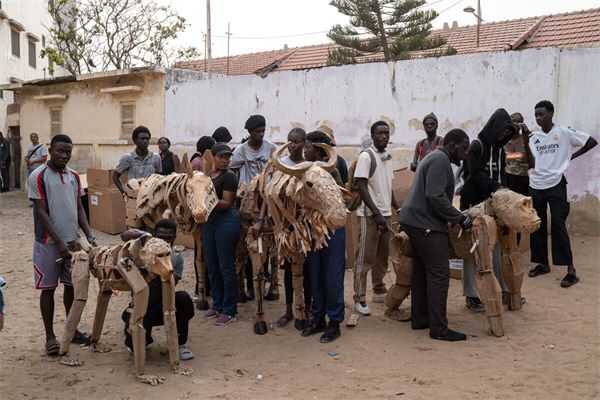
The Herds Public Art Project, Dakar, Senegal, April 25, 2025
Nicolas Réméné / Le Pictorium
LePictorium_0307500.jpg
Puppeteer artists from the new public art project The Herds prepare to parade life-size wild animal puppets through the streets of Dakar's Medina district on April 25, 2025. The puppets for THE HERDS, designed by Ukwanda Puppets and Designs Art Collective, interact with the public during live performances intended to raise awareness about the effects of climate change. A 20,000 km journey between the Congo Basin and the Arctic Circle that will cross more than a dozen countries for nearly 4 months.
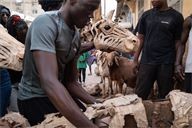
The Herds Public Art Project, Dakar, Senegal, April 25, 2025
Nicolas Réméné / Le Pictorium
LePictorium_0307501.jpg
Puppeteer artists from the new public art project The Herds prepare to parade life-size wild animal puppets through the streets of Dakar's Medina district on April 25, 2025. The puppets for THE HERDS, designed by Ukwanda Puppets and Designs Art Collective, interact with the public during live performances intended to raise awareness about the effects of climate change. A 20,000 km journey between the Congo Basin and the Arctic Circle that will cross more than a dozen countries for nearly 4 months.
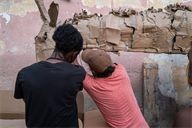
The Herds Public Art Project, Dakar, Senegal, April 25, 2025
Nicolas Réméné / Le Pictorium
LePictorium_0307502.jpg
Puppeteer artists from the new public art project The Herds prepare to parade life-size wild animal puppets through the streets of Dakar's Medina district on April 25, 2025. The puppets for THE HERDS, designed by Ukwanda Puppets and Designs Art Collective, interact with the public during live performances intended to raise awareness about the effects of climate change. A 20,000 km journey between the Congo Basin and the Arctic Circle that will cross more than a dozen countries for nearly 4 months.
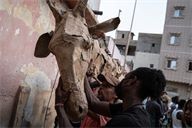
The Herds Public Art Project, Dakar, Senegal, April 25, 2025
Nicolas Réméné / Le Pictorium
LePictorium_0307503.jpg
Puppeteer artists from the new public art project The Herds prepare to parade life-size wild animal puppets through the streets of Dakar's Medina district on April 25, 2025. The puppets for THE HERDS, designed by Ukwanda Puppets and Designs Art Collective, interact with the public during live performances intended to raise awareness about the effects of climate change. A 20,000 km journey between the Congo Basin and the Arctic Circle that will cross more than a dozen countries for nearly 4 months.
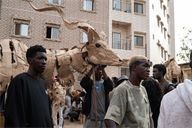
The Herds Public Art Project, Dakar, Senegal, April 25, 2025
Nicolas Réméné / Le Pictorium
LePictorium_0307504.jpg
Puppeteer artists from the new public art project The Herds prepare to parade life-size wild animal puppets through the streets of Dakar's Medina district on April 25, 2025. The puppets for THE HERDS, designed by Ukwanda Puppets and Designs Art Collective, interact with the public during live performances intended to raise awareness about the effects of climate change. A 20,000 km journey between the Congo Basin and the Arctic Circle that will cross more than a dozen countries for nearly 4 months.
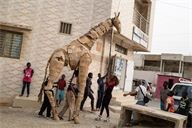
The Herds Public Art Project, Dakar, Senegal, April 25, 2025
Nicolas Réméné / Le Pictorium
LePictorium_0307505.jpg
Puppeteer artists from the new public art project The Herds move life-size wild animal puppets through the streets of Dakar's Medina district on April 25, 2025. They roam the streets of a central Dakar neighborhood to encounter a creation by visual artist Fabrice Monteiro. A spirit or goddess is there on a street corner to alert us, like a prophecy, that the connection between all living beings is threatened. The puppets for THE HERDS, designed by Ukwanda Puppets and Designs Art Collective, interact with the public during live performances intended to raise awareness of the effects of climate change. A 20,000 km journey between the Congo Basin and the Arctic Circle that will cross more than a dozen countries for nearly 4 months.
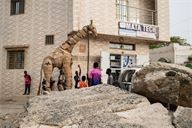
The Herds Public Art Project, Dakar, Senegal, April 25, 2025
Nicolas Réméné / Le Pictorium
LePictorium_0307506.jpg
Puppeteer artists from the new public art project The Herds move life-size wild animal puppets through the streets of Dakar's Medina district on April 25, 2025. They roam the streets of a central Dakar neighborhood to encounter a creation by visual artist Fabrice Monteiro. A spirit or goddess is there on a street corner to alert us, like a prophecy, that the connection between all living beings is threatened. The puppets for THE HERDS, designed by Ukwanda Puppets and Designs Art Collective, interact with the public during live performances intended to raise awareness of the effects of climate change. A 20,000 km journey between the Congo Basin and the Arctic Circle that will cross more than a dozen countries for nearly 4 months.
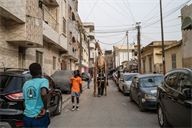
The Herds Public Art Project, Dakar, Senegal, April 25, 2025
Nicolas Réméné / Le Pictorium
LePictorium_0307507.jpg
Puppeteer artists from the new public art project The Herds move life-size wild animal puppets through the streets of Dakar's Medina district on April 25, 2025. They roam the streets of a central Dakar neighborhood to encounter a creation by visual artist Fabrice Monteiro. A spirit or goddess is there on a street corner to alert us, like a prophecy, that the connection between all living beings is threatened. The puppets for THE HERDS, designed by Ukwanda Puppets and Designs Art Collective, interact with the public during live performances intended to raise awareness of the effects of climate change. A 20,000 km journey between the Congo Basin and the Arctic Circle that will cross more than a dozen countries for nearly 4 months.
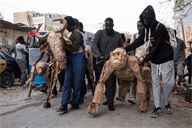
The Herds Public Art Project, Dakar, Senegal, April 25, 2025
Nicolas Réméné / Le Pictorium
LePictorium_0307508.jpg
Puppeteer artists from the new public art project The Herds move life-size wild animal puppets through the streets of Dakar's Medina district on April 25, 2025. They roam the streets of a central Dakar neighborhood to encounter a creation by visual artist Fabrice Monteiro. A spirit or goddess is there on a street corner to alert us, like a prophecy, that the connection between all living beings is threatened. The puppets for THE HERDS, designed by Ukwanda Puppets and Designs Art Collective, interact with the public during live performances intended to raise awareness of the effects of climate change. A 20,000 km journey between the Congo Basin and the Arctic Circle that will cross more than a dozen countries for nearly 4 months.
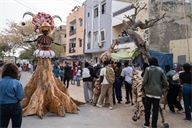
The Herds Public Art Project, Dakar, Senegal, April 25, 2025
Nicolas Réméné / Le Pictorium
LePictorium_0307509.jpg
Puppeteer artists from the new public art project The Herds move life-size wild animal puppets through the streets of Dakar's Medina district on April 25, 2025. They roam the streets of a central Dakar neighborhood to encounter a creation by visual artist Fabrice Monteiro. A spirit or goddess is there on a street corner to alert us, like a prophecy, that the connection between all living beings is threatened. The puppets for THE HERDS, designed by Ukwanda Puppets and Designs Art Collective, interact with the public during live performances intended to raise awareness of the effects of climate change. A 20,000 km journey between the Congo Basin and the Arctic Circle that will cross more than a dozen countries for nearly 4 months.
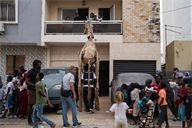
The Herds Public Art Project, Dakar, Senegal, April 25, 2025
Nicolas Réméné / Le Pictorium
LePictorium_0307510.jpg
Puppeteer artists from the new public art project The Herds move life-size wild animal puppets through the streets of Dakar's Medina district on April 25, 2025. They roam the streets of a central Dakar neighborhood to encounter a creation by visual artist Fabrice Monteiro. A spirit or goddess is there on a street corner to alert us, like a prophecy, that the connection between all living beings is threatened. The puppets for THE HERDS, designed by Ukwanda Puppets and Designs Art Collective, interact with the public during live performances intended to raise awareness of the effects of climate change. A 20,000 km journey between the Congo Basin and the Arctic Circle that will cross more than a dozen countries for nearly 4 months.
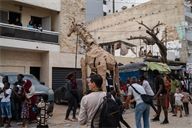
The Herds Public Art Project, Dakar, Senegal, April 25, 2025
Nicolas Réméné / Le Pictorium
LePictorium_0307511.jpg
Puppeteer artists from the new public art project The Herds move life-size wild animal puppets through the streets of Dakar's Medina district on April 25, 2025. They roam the streets of a central Dakar neighborhood to encounter a creation by visual artist Fabrice Monteiro. A spirit or goddess is there on a street corner to alert us, like a prophecy, that the connection between all living beings is threatened. The puppets for THE HERDS, designed by Ukwanda Puppets and Designs Art Collective, interact with the public during live performances intended to raise awareness of the effects of climate change. A 20,000 km journey between the Congo Basin and the Arctic Circle that will cross more than a dozen countries for nearly 4 months.
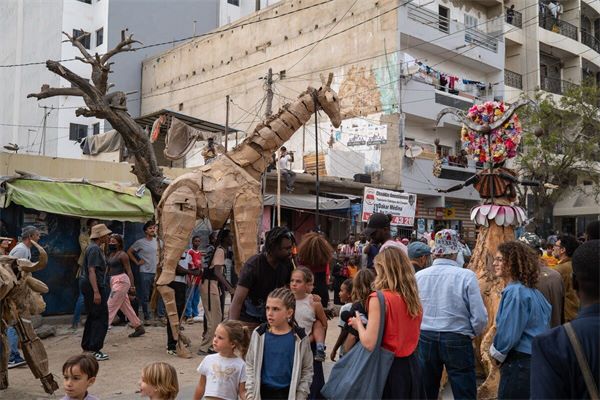
The Herds Public Art Project, Dakar, Senegal, April 25, 2025
Nicolas Réméné / Le Pictorium
LePictorium_0307512.jpg
Puppeteer artists from the new public art project The Herds move life-size wild animal puppets through the streets of Dakar's Medina district on April 25, 2025. They roam the streets of a central Dakar neighborhood to encounter a creation by visual artist Fabrice Monteiro. A spirit or goddess is there on a street corner to alert us, like a prophecy, that the connection between all living beings is threatened. The puppets for THE HERDS, designed by Ukwanda Puppets and Designs Art Collective, interact with the public during live performances intended to raise awareness of the effects of climate change. A 20,000 km journey between the Congo Basin and the Arctic Circle that will cross more than a dozen countries for nearly 4 months.
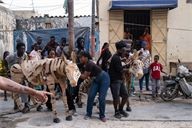
The Herds Public Art Project, Dakar, Senegal, April 25, 2025
Nicolas Réméné / Le Pictorium
LePictorium_0307513.jpg
Puppeteer artists from the new public art project The Herds move life-size wild animal puppets through the streets of Dakar's Medina district on April 25, 2025. They roam the streets of a central Dakar neighborhood to encounter a creation by visual artist Fabrice Monteiro. A spirit or goddess is there on a street corner to alert us, like a prophecy, that the connection between all living beings is threatened. The puppets for THE HERDS, designed by Ukwanda Puppets and Designs Art Collective, interact with the public during live performances intended to raise awareness of the effects of climate change. A 20,000 km journey between the Congo Basin and the Arctic Circle that will cross more than a dozen countries for nearly 4 months.
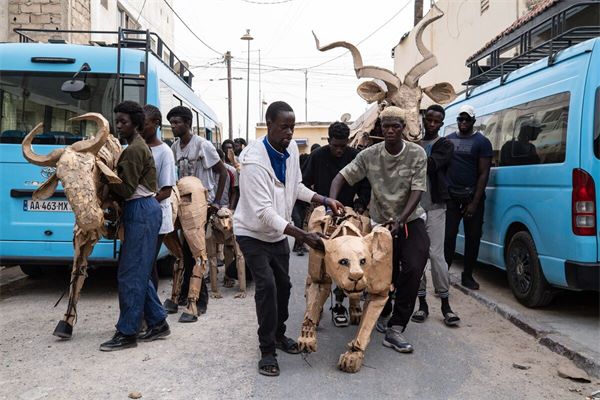
The Herds Public Art Project, Dakar, Senegal, April 25, 2025
Nicolas Réméné / Le Pictorium
LePictorium_0307514.jpg
Puppeteer artists from the new public art project The Herds move life-size wild animal puppets through the streets of Dakar's Medina district on April 25, 2025. They roam the streets of a central Dakar neighborhood to encounter a creation by visual artist Fabrice Monteiro. A spirit or goddess is there on a street corner to alert us, like a prophecy, that the connection between all living beings is threatened. The puppets for THE HERDS, designed by Ukwanda Puppets and Designs Art Collective, interact with the public during live performances intended to raise awareness of the effects of climate change. A 20,000 km journey between the Congo Basin and the Arctic Circle that will cross more than a dozen countries for nearly 4 months.

The Herds Public Art Project, Dakar, Senegal, April 25, 2025
Nicolas Réméné / Le Pictorium
LePictorium_0307515.jpg
Puppeteer artists from the new public art project The Herds move life-size wild animal puppets through the streets of Dakar's Medina district on April 25, 2025. They roam the streets of a central Dakar neighborhood to encounter a creation by visual artist Fabrice Monteiro. A spirit or goddess is there on a street corner to alert us, like a prophecy, that the connection between all living beings is threatened. The puppets for THE HERDS, designed by Ukwanda Puppets and Designs Art Collective, interact with the public during live performances intended to raise awareness of the effects of climate change. A 20,000 km journey between the Congo Basin and the Arctic Circle that will cross more than a dozen countries for nearly 4 months.
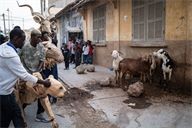
The Herds Public Art Project, Dakar, Senegal, April 25, 2025
Nicolas Réméné / Le Pictorium
LePictorium_0307516.jpg
Puppeteer artists from the new public art project The Herds move life-size wild animal puppets through the streets of Dakar's Medina district on April 25, 2025. They roam the streets of a central Dakar neighborhood to encounter a creation by visual artist Fabrice Monteiro. A spirit or goddess is there on a street corner to alert us, like a prophecy, that the connection between all living beings is threatened. The puppets for THE HERDS, designed by Ukwanda Puppets and Designs Art Collective, interact with the public during live performances intended to raise awareness of the effects of climate change. A 20,000 km journey between the Congo Basin and the Arctic Circle that will cross more than a dozen countries for nearly 4 months.
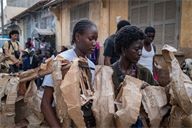
The Herds Public Art Project, Dakar, Senegal, April 25, 2025
Nicolas Réméné / Le Pictorium
LePictorium_0307517.jpg
Puppeteer artists from the new public art project The Herds move life-size wild animal puppets through the streets of Dakar's Medina district on April 25, 2025. They roam the streets of a central Dakar neighborhood to encounter a creation by visual artist Fabrice Monteiro. A spirit or goddess is there on a street corner to alert us, like a prophecy, that the connection between all living beings is threatened. The puppets for THE HERDS, designed by Ukwanda Puppets and Designs Art Collective, interact with the public during live performances intended to raise awareness of the effects of climate change. A 20,000 km journey between the Congo Basin and the Arctic Circle that will cross more than a dozen countries for nearly 4 months.
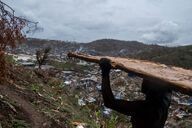
MAYOTTE, cyclone Chido
Michael Bunel / Le Pictorium
LePictorium_0300952.jpg
View of the Kaweni slum. the houses, the -bangas- made of sheet metal did not resist the passage of the cyclone. Eight days after the disaster, residents salvaged what they could from the debris to rebuild their barracks. December 23, 2024. Mamoudzou, Mayotte.
The island of Mayotte is devastated after the passage of Cyclone Chido which hit the island on December 14. The population of the slums from Comorian immigration, already destitute before the passage of the cyclone, complains of the lack of help. “It’s food and drink that we need”, “we still haven’t seen help” quickly confided women in the heights of the Kaweni slum. Civil society is organizing to compensate for the lack of action by the State on site, which is slow in getting water and food to the entire population. The aid announced by the French government is blocked in Reunion. Firefighters, Red Cross, civil protection, all were offered to go into the field but without their cargo! How to intervene when technical means are not available. On the island, no or little distribution of food and water. When this is the case, it is the locals who become volunteers and who provide a minimum of daily support. Liberal nurses, teachers or simple local residents, all provide their support to take care of those most affected. The only place of refuge after the destruction of the shanty towns by the cyclone, the colleges and schools. In Mamoudzou alone, the capital, 2,000 people are sheltered in establishments. But everything is missing! The principal of a college takes responsibility for purchasing supplies when at the Lycée des Lumières, local residents have just spent 400 euros to be able to obtain rice. In the heights of Mamoudzou, the Kawani slum is already recovering. The resilience of the “banga” population is equal to the disaster. The sound of hammers on metal sheets is omnipresent! The rainy season is underway and finding a roof over your head is a priority!
The island of Mayotte is devastated after the passage of Cyclone Chido which hit the island on December 14. The population of the slums from Comorian immigration, already destitute before the passage of the cyclone, complains of the lack of help. “It’s food and drink that we need”, “we still haven’t seen help” quickly confided women in the heights of the Kaweni slum. Civil society is organizing to compensate for the lack of action by the State on site, which is slow in getting water and food to the entire population. The aid announced by the French government is blocked in Reunion. Firefighters, Red Cross, civil protection, all were offered to go into the field but without their cargo! How to intervene when technical means are not available. On the island, no or little distribution of food and water. When this is the case, it is the locals who become volunteers and who provide a minimum of daily support. Liberal nurses, teachers or simple local residents, all provide their support to take care of those most affected. The only place of refuge after the destruction of the shanty towns by the cyclone, the colleges and schools. In Mamoudzou alone, the capital, 2,000 people are sheltered in establishments. But everything is missing! The principal of a college takes responsibility for purchasing supplies when at the Lycée des Lumières, local residents have just spent 400 euros to be able to obtain rice. In the heights of Mamoudzou, the Kawani slum is already recovering. The resilience of the “banga” population is equal to the disaster. The sound of hammers on metal sheets is omnipresent! The rainy season is underway and finding a roof over your head is a priority!
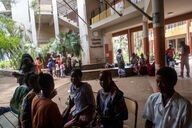
MAYOTTE, cyclone Chido
Michael Bunel / Le Pictorium
LePictorium_0300953.jpg
View of the Vahibé slum in the center of the island. Before the cyclone, the center of the island was a green lung and the shanty towns were hidden by vegetation. With the passage of the cyclone all the vegetation is destroyed and the inhabitants suffer both from the extreme heat under the tin huts and from the heavy rains of the season. December 23, 2024. Vahibé, France.
The island of Mayotte is devastated after the passage of Cyclone Chido which hit the island on December 14. The population of the slums from Comorian immigration, already destitute before the passage of the cyclone, complains of the lack of help. “It’s food and drink that we need”, “we still haven’t seen help” quickly confided women in the heights of the Kaweni slum. Civil society is organizing to compensate for the lack of action by the State on site, which is slow in getting water and food to the entire population. The aid announced by the French government is blocked in Reunion. Firefighters, Red Cross, civil protection, all were offered to go into the field but without their cargo! How to intervene when technical means are not available. On the island, no or little distribution of food and water. When this is the case, it is the locals who become volunteers and who provide a minimum of daily support. Liberal nurses, teachers or simple local residents, all provide their support to take care of those most affected. The only place of refuge after the destruction of the shanty towns by the cyclone, the colleges and schools. In Mamoudzou alone, the capital, 2,000 people are sheltered in establishments. But everything is missing! The principal of a college takes responsibility for purchasing supplies when at the Lycée des Lumières, local residents have just spent 400 euros to be able to obtain rice. In the heights of Mamoudzou, the Kawani slum is already recovering. The resilience of the “banga” population is equal to the disaster. The sound of hammers on metal sheets is omnipresent! The rainy season is underway and finding a roof over your head is a priority!
The island of Mayotte is devastated after the passage of Cyclone Chido which hit the island on December 14. The population of the slums from Comorian immigration, already destitute before the passage of the cyclone, complains of the lack of help. “It’s food and drink that we need”, “we still haven’t seen help” quickly confided women in the heights of the Kaweni slum. Civil society is organizing to compensate for the lack of action by the State on site, which is slow in getting water and food to the entire population. The aid announced by the French government is blocked in Reunion. Firefighters, Red Cross, civil protection, all were offered to go into the field but without their cargo! How to intervene when technical means are not available. On the island, no or little distribution of food and water. When this is the case, it is the locals who become volunteers and who provide a minimum of daily support. Liberal nurses, teachers or simple local residents, all provide their support to take care of those most affected. The only place of refuge after the destruction of the shanty towns by the cyclone, the colleges and schools. In Mamoudzou alone, the capital, 2,000 people are sheltered in establishments. But everything is missing! The principal of a college takes responsibility for purchasing supplies when at the Lycée des Lumières, local residents have just spent 400 euros to be able to obtain rice. In the heights of Mamoudzou, the Kawani slum is already recovering. The resilience of the “banga” population is equal to the disaster. The sound of hammers on metal sheets is omnipresent! The rainy season is underway and finding a roof over your head is a priority!
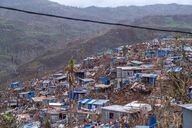
MAYOTTE, cyclone Chido
Michael Bunel / Le Pictorium
LePictorium_0300954.jpg
View of the Kaweni slum. the houses, the -bangas- made of sheet metal did not resist the passage of the cyclone. Eight days after the disaster, residents salvaged what they could from the debris to rebuild their barracks. December 23, 2024. Mamoudzou, Mayotte.
The island of Mayotte is devastated after the passage of Cyclone Chido which hit the island on December 14. The population of the slums from Comorian immigration, already destitute before the passage of the cyclone, complains of the lack of help. “It’s food and drink that we need”, “we still haven’t seen help” quickly confided women in the heights of the Kaweni slum. Civil society is organizing to compensate for the lack of action by the State on site, which is slow in getting water and food to the entire population. The aid announced by the French government is blocked in Reunion. Firefighters, Red Cross, civil protection, all were offered to go into the field but without their cargo! How to intervene when technical means are not available. On the island, no or little distribution of food and water. When this is the case, it is the locals who become volunteers and who provide a minimum of daily support. Liberal nurses, teachers or simple local residents, all provide their support to take care of those most affected. The only place of refuge after the destruction of the shanty towns by the cyclone, the colleges and schools. In Mamoudzou alone, the capital, 2,000 people are sheltered in establishments. But everything is missing! The principal of a college takes responsibility for purchasing supplies when at the Lycée des Lumières, local residents have just spent 400 euros to be able to obtain rice. In the heights of Mamoudzou, the Kawani slum is already recovering. The resilience of the “banga” population is equal to the disaster. The sound of hammers on metal sheets is omnipresent! The rainy season is underway and finding a roof over your head is a priority!
The island of Mayotte is devastated after the passage of Cyclone Chido which hit the island on December 14. The population of the slums from Comorian immigration, already destitute before the passage of the cyclone, complains of the lack of help. “It’s food and drink that we need”, “we still haven’t seen help” quickly confided women in the heights of the Kaweni slum. Civil society is organizing to compensate for the lack of action by the State on site, which is slow in getting water and food to the entire population. The aid announced by the French government is blocked in Reunion. Firefighters, Red Cross, civil protection, all were offered to go into the field but without their cargo! How to intervene when technical means are not available. On the island, no or little distribution of food and water. When this is the case, it is the locals who become volunteers and who provide a minimum of daily support. Liberal nurses, teachers or simple local residents, all provide their support to take care of those most affected. The only place of refuge after the destruction of the shanty towns by the cyclone, the colleges and schools. In Mamoudzou alone, the capital, 2,000 people are sheltered in establishments. But everything is missing! The principal of a college takes responsibility for purchasing supplies when at the Lycée des Lumières, local residents have just spent 400 euros to be able to obtain rice. In the heights of Mamoudzou, the Kawani slum is already recovering. The resilience of the “banga” population is equal to the disaster. The sound of hammers on metal sheets is omnipresent! The rainy season is underway and finding a roof over your head is a priority!
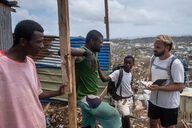
MAYOTTE, cyclone Chido
Michael Bunel / Le Pictorium
LePictorium_0300955.jpg
Niels, a resident of Mayotte and former math teacher, helps the residents of the Kaweni slum by distributing tablets for water decontamination. The tablets provide consumable water 30 minutes after mixing and the water can be consumed for 12 hours. One tablet makes 1 liter of water drinkable. December 23, 2024. Mamoudzou, Mayotte.
The island of Mayotte is devastated after the passage of Cyclone Chido which hit the island on December 14. The population of the slums from Comorian immigration, already destitute before the passage of the cyclone, complains of the lack of help. “It’s food and drink that we need”, “we still haven’t seen help” quickly confided women in the heights of the Kaweni slum. Civil society is organizing to compensate for the lack of action by the State on site, which is slow in getting water and food to the entire population. The aid announced by the French government is blocked in Reunion. Firefighters, Red Cross, civil protection, all were offered to go into the field but without their cargo! How to intervene when technical means are not available. On the island, no or little distribution of food and water. When this is the case, it is the locals who become volunteers and who provide a minimum of daily support. Liberal nurses, teachers or simple local residents, all provide their support to take care of those most affected. The only place of refuge after the destruction of the shanty towns by the cyclone, the colleges and schools. In Mamoudzou alone, the capital, 2,000 people are sheltered in establishments. But everything is missing! The principal of a college takes responsibility for purchasing supplies when at the Lycée des Lumières, local residents have just spent 400 euros to be able to obtain rice. In the heights of Mamoudzou, the Kawani slum is already recovering. The resilience of the “banga” population is equal to the disaster. The sound of hammers on metal sheets is omnipresent! The rainy season is underway and finding a roof over your head is a priority!
The island of Mayotte is devastated after the passage of Cyclone Chido which hit the island on December 14. The population of the slums from Comorian immigration, already destitute before the passage of the cyclone, complains of the lack of help. “It’s food and drink that we need”, “we still haven’t seen help” quickly confided women in the heights of the Kaweni slum. Civil society is organizing to compensate for the lack of action by the State on site, which is slow in getting water and food to the entire population. The aid announced by the French government is blocked in Reunion. Firefighters, Red Cross, civil protection, all were offered to go into the field but without their cargo! How to intervene when technical means are not available. On the island, no or little distribution of food and water. When this is the case, it is the locals who become volunteers and who provide a minimum of daily support. Liberal nurses, teachers or simple local residents, all provide their support to take care of those most affected. The only place of refuge after the destruction of the shanty towns by the cyclone, the colleges and schools. In Mamoudzou alone, the capital, 2,000 people are sheltered in establishments. But everything is missing! The principal of a college takes responsibility for purchasing supplies when at the Lycée des Lumières, local residents have just spent 400 euros to be able to obtain rice. In the heights of Mamoudzou, the Kawani slum is already recovering. The resilience of the “banga” population is equal to the disaster. The sound of hammers on metal sheets is omnipresent! The rainy season is underway and finding a roof over your head is a priority!
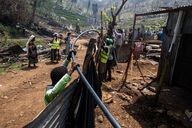
MAYOTTE, cyclone Chido
Michael Bunel / Le Pictorium
LePictorium_0300956.jpg
Installation of a water point by Solidarités International teams in the Kersoni slum. The system works thanks to the difference in height of the slope. The water is collected in a retention basin located higher up the hill. The water is not good for consumption but saves many trips for the population. December 25, 2024. Koungou, Mayotte.
The island of Mayotte is devastated after the passage of Cyclone Chido which hit the island on December 14. The population of the slums from Comorian immigration, already destitute before the passage of the cyclone, complains of the lack of help. “It’s food and drink that we need”, “we still haven’t seen help” quickly confided women in the heights of the Kaweni slum. Civil society is organizing to compensate for the lack of action by the State on site, which is slow in getting water and food to the entire population. The aid announced by the French government is blocked in Reunion. Firefighters, Red Cross, civil protection, all were offered to go into the field but without their cargo! How to intervene when technical means are not available. On the island, no or little distribution of food and water. When this is the case, it is the locals who become volunteers and who provide a minimum of daily support. Liberal nurses, teachers or simple local residents, all provide their support to take care of those most affected. The only place of refuge after the destruction of the shanty towns by the cyclone, the colleges and schools. In Mamoudzou alone, the capital, 2,000 people are sheltered in establishments. But everything is missing! The principal of a college takes responsibility for purchasing supplies when at the Lycée des Lumières, local residents have just spent 400 euros to be able to obtain rice. In the heights of Mamoudzou, the Kawani slum is already recovering. The resilience of the “banga” population is equal to the disaster. The sound of hammers on metal sheets is omnipresent! The rainy season is underway and finding a roof over your head is a priority!
The island of Mayotte is devastated after the passage of Cyclone Chido which hit the island on December 14. The population of the slums from Comorian immigration, already destitute before the passage of the cyclone, complains of the lack of help. “It’s food and drink that we need”, “we still haven’t seen help” quickly confided women in the heights of the Kaweni slum. Civil society is organizing to compensate for the lack of action by the State on site, which is slow in getting water and food to the entire population. The aid announced by the French government is blocked in Reunion. Firefighters, Red Cross, civil protection, all were offered to go into the field but without their cargo! How to intervene when technical means are not available. On the island, no or little distribution of food and water. When this is the case, it is the locals who become volunteers and who provide a minimum of daily support. Liberal nurses, teachers or simple local residents, all provide their support to take care of those most affected. The only place of refuge after the destruction of the shanty towns by the cyclone, the colleges and schools. In Mamoudzou alone, the capital, 2,000 people are sheltered in establishments. But everything is missing! The principal of a college takes responsibility for purchasing supplies when at the Lycée des Lumières, local residents have just spent 400 euros to be able to obtain rice. In the heights of Mamoudzou, the Kawani slum is already recovering. The resilience of the “banga” population is equal to the disaster. The sound of hammers on metal sheets is omnipresent! The rainy season is underway and finding a roof over your head is a priority!
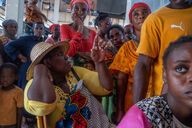
MAYOTTE, cyclone Chido
Michael Bunel / Le Pictorium
LePictorium_0300957.jpg
End of the day at the LPO school. Every day, the staff of the establishment takes stock of the people who are going to sleep in the school which has been transformed into an accommodation center since the cyclone hit the island. The day is mainly women who are there because the men are in the slums rebuilding the barracks which serve as homes for thousands of Comorians. Mamoudzou, Mayotte.
The island of Mayotte is devastated after the passage of Cyclone Chido which hit the island on December 14. The population of the slums from Comorian immigration, already destitute before the passage of the cyclone, complains of the lack of help. “It’s food and drink that we need”, “we still haven’t seen help” quickly confided women in the heights of the Kaweni slum. Civil society is organizing to compensate for the lack of action by the State on site, which is slow in getting water and food to the entire population. The aid announced by the French government is blocked in Reunion. Firefighters, Red Cross, civil protection, all were offered to go into the field but without their cargo! How to intervene when technical means are not available. On the island, no or little distribution of food and water. When this is the case, it is the locals who become volunteers and who provide a minimum of daily support. Liberal nurses, teachers or simple local residents, all provide their support to take care of those most affected. The only place of refuge after the destruction of the shanty towns by the cyclone, the colleges and schools. In Mamoudzou alone, the capital, 2,000 people are sheltered in establishments. But everything is missing! The principal of a college takes responsibility for purchasing supplies when at the Lycée des Lumières, local residents have just spent 400 euros to be able to obtain rice. In the heights of Mamoudzou, the Kawani slum is already recovering. The resilience of the “banga” population is equal to the disaster. The sound of hammers on metal sheets is omnipresent! The rainy season is underway and finding a roof over your head is a priority!
The island of Mayotte is devastated after the passage of Cyclone Chido which hit the island on December 14. The population of the slums from Comorian immigration, already destitute before the passage of the cyclone, complains of the lack of help. “It’s food and drink that we need”, “we still haven’t seen help” quickly confided women in the heights of the Kaweni slum. Civil society is organizing to compensate for the lack of action by the State on site, which is slow in getting water and food to the entire population. The aid announced by the French government is blocked in Reunion. Firefighters, Red Cross, civil protection, all were offered to go into the field but without their cargo! How to intervene when technical means are not available. On the island, no or little distribution of food and water. When this is the case, it is the locals who become volunteers and who provide a minimum of daily support. Liberal nurses, teachers or simple local residents, all provide their support to take care of those most affected. The only place of refuge after the destruction of the shanty towns by the cyclone, the colleges and schools. In Mamoudzou alone, the capital, 2,000 people are sheltered in establishments. But everything is missing! The principal of a college takes responsibility for purchasing supplies when at the Lycée des Lumières, local residents have just spent 400 euros to be able to obtain rice. In the heights of Mamoudzou, the Kawani slum is already recovering. The resilience of the “banga” population is equal to the disaster. The sound of hammers on metal sheets is omnipresent! The rainy season is underway and finding a roof over your head is a priority!
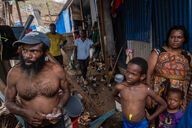
MAYOTTE, cyclone Chido
Michael Bunel / Le Pictorium
LePictorium_0300958.jpg
Part of the Isoufi family in their -banga-. The family, like other residents of the slum, have not seen any help for 6 days. The population, already destitute before the cyclone, complained of a lack of relief. “It’s food and drink that we need”, “we still haven’t seen help” women confided to me in the heights of the Kaweni slum. December 20, 2024. Mamoudzou, Mayotte.
The island of Mayotte is devastated after the passage of Cyclone Chido which hit the island on December 14. The population of the slums from Comorian immigration, already destitute before the passage of the cyclone, complains of the lack of help. “It’s food and drink that we need”, “we still haven’t seen help” quickly confided women in the heights of the Kaweni slum. Civil society is organizing to compensate for the lack of action by the State on site, which is slow in getting water and food to the entire population. The aid announced by the French government is blocked in Reunion. Firefighters, Red Cross, civil protection, all were offered to go into the field but without their cargo! How to intervene when technical means are not available. On the island, no or little distribution of food and water. When this is the case, it is the locals who become volunteers and who provide a minimum of daily support. Liberal nurses, teachers or simple local residents, all provide their support to take care of those most affected. The only place of refuge after the destruction of the shanty towns by the cyclone, the colleges and schools. In Mamoudzou alone, the capital, 2,000 people are sheltered in establishments. But everything is missing! The principal of a college takes responsibility for purchasing supplies when at the Lycée des Lumières, local residents have just spent 400 euros to be able to obtain rice. In the heights of Mamoudzou, the Kawani slum is already recovering. The resilience of the “banga” population is equal to the disaster. The sound of hammers on metal sheets is omnipresent! The rainy season is underway and finding a roof over your head is a priority!
The island of Mayotte is devastated after the passage of Cyclone Chido which hit the island on December 14. The population of the slums from Comorian immigration, already destitute before the passage of the cyclone, complains of the lack of help. “It’s food and drink that we need”, “we still haven’t seen help” quickly confided women in the heights of the Kaweni slum. Civil society is organizing to compensate for the lack of action by the State on site, which is slow in getting water and food to the entire population. The aid announced by the French government is blocked in Reunion. Firefighters, Red Cross, civil protection, all were offered to go into the field but without their cargo! How to intervene when technical means are not available. On the island, no or little distribution of food and water. When this is the case, it is the locals who become volunteers and who provide a minimum of daily support. Liberal nurses, teachers or simple local residents, all provide their support to take care of those most affected. The only place of refuge after the destruction of the shanty towns by the cyclone, the colleges and schools. In Mamoudzou alone, the capital, 2,000 people are sheltered in establishments. But everything is missing! The principal of a college takes responsibility for purchasing supplies when at the Lycée des Lumières, local residents have just spent 400 euros to be able to obtain rice. In the heights of Mamoudzou, the Kawani slum is already recovering. The resilience of the “banga” population is equal to the disaster. The sound of hammers on metal sheets is omnipresent! The rainy season is underway and finding a roof over your head is a priority!
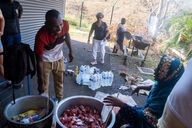
MAYOTTE, cyclone Chido
Michael Bunel / Le Pictorium
LePictorium_0300959.jpg
Bakar lost everything during the cyclone, his “banga” was totally destroyed. He takes care of his mother as best he can because she cannot move around. Vahibé slum in the center of the island. December 23, 2024. Vahibé, Mayotte.
The island of Mayotte is devastated after the passage of Cyclone Chido which hit the island on December 14. The population of the slums from Comorian immigration, already destitute before the passage of the cyclone, complains of the lack of help. “It’s food and drink that we need”, “we still haven’t seen help” quickly confided women in the heights of the Kaweni slum. Civil society is organizing to compensate for the lack of action by the State on site, which is slow in getting water and food to the entire population. The aid announced by the French government is blocked in Reunion. Firefighters, Red Cross, civil protection, all were offered to go into the field but without their cargo! How to intervene when technical means are not available. On the island, no or little distribution of food and water. When this is the case, it is the locals who become volunteers and who provide a minimum of daily support. Liberal nurses, teachers or simple local residents, all provide their support to take care of those most affected. The only place of refuge after the destruction of the shanty towns by the cyclone, the colleges and schools. In Mamoudzou alone, the capital, 2,000 people are sheltered in establishments. But everything is missing! The principal of a college takes responsibility for purchasing supplies when at the Lycée des Lumières, local residents have just spent 400 euros to be able to obtain rice. In the heights of Mamoudzou, the Kawani slum is already recovering. The resilience of the “banga” population is equal to the disaster. The sound of hammers on metal sheets is omnipresent! The rainy season is underway and finding a roof over your head is a priority!
The island of Mayotte is devastated after the passage of Cyclone Chido which hit the island on December 14. The population of the slums from Comorian immigration, already destitute before the passage of the cyclone, complains of the lack of help. “It’s food and drink that we need”, “we still haven’t seen help” quickly confided women in the heights of the Kaweni slum. Civil society is organizing to compensate for the lack of action by the State on site, which is slow in getting water and food to the entire population. The aid announced by the French government is blocked in Reunion. Firefighters, Red Cross, civil protection, all were offered to go into the field but without their cargo! How to intervene when technical means are not available. On the island, no or little distribution of food and water. When this is the case, it is the locals who become volunteers and who provide a minimum of daily support. Liberal nurses, teachers or simple local residents, all provide their support to take care of those most affected. The only place of refuge after the destruction of the shanty towns by the cyclone, the colleges and schools. In Mamoudzou alone, the capital, 2,000 people are sheltered in establishments. But everything is missing! The principal of a college takes responsibility for purchasing supplies when at the Lycée des Lumières, local residents have just spent 400 euros to be able to obtain rice. In the heights of Mamoudzou, the Kawani slum is already recovering. The resilience of the “banga” population is equal to the disaster. The sound of hammers on metal sheets is omnipresent! The rainy season is underway and finding a roof over your head is a priority!
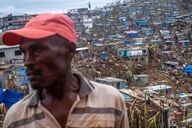
MAYOTTE, cyclone Chido
Michael Bunel / Le Pictorium
LePictorium_0300960.jpg
Vahibé village inland.
The island of Mayotte is devastated after the passage of Cyclone Chido which hit the island on December 14. The population of the slums from Comorian immigration, already destitute before the passage of the cyclone, complains of the lack of help. “It’s food and drink that we need”, “we still haven’t seen help” quickly confided women in the heights of the Kaweni slum. Civil society is organizing to compensate for the lack of action by the State on site, which is slow in getting water and food to the entire population. The aid announced by the French government is blocked in Reunion. Firefighters, Red Cross, civil protection, all were offered to go into the field but without their cargo! How to intervene when technical means are not available. On the island, no or little distribution of food and water. When this is the case, it is the locals who become volunteers and who provide a minimum of daily support. Liberal nurses, teachers or simple local residents, all provide their support to take care of those most affected. The only place of refuge after the destruction of the shanty towns by the cyclone, the colleges and schools. In Mamoudzou alone, the capital, 2,000 people are sheltered in establishments. But everything is missing! The principal of a college takes responsibility for purchasing supplies when at the Lycée des Lumières, local residents have just spent 400 euros to be able to obtain rice. In the heights of Mamoudzou, the Kawani slum is already recovering. The resilience of the “banga” population is equal to the disaster. The sound of hammers on metal sheets is omnipresent! The rainy season is underway and finding a roof over your head is a priority!
The island of Mayotte is devastated after the passage of Cyclone Chido which hit the island on December 14. The population of the slums from Comorian immigration, already destitute before the passage of the cyclone, complains of the lack of help. “It’s food and drink that we need”, “we still haven’t seen help” quickly confided women in the heights of the Kaweni slum. Civil society is organizing to compensate for the lack of action by the State on site, which is slow in getting water and food to the entire population. The aid announced by the French government is blocked in Reunion. Firefighters, Red Cross, civil protection, all were offered to go into the field but without their cargo! How to intervene when technical means are not available. On the island, no or little distribution of food and water. When this is the case, it is the locals who become volunteers and who provide a minimum of daily support. Liberal nurses, teachers or simple local residents, all provide their support to take care of those most affected. The only place of refuge after the destruction of the shanty towns by the cyclone, the colleges and schools. In Mamoudzou alone, the capital, 2,000 people are sheltered in establishments. But everything is missing! The principal of a college takes responsibility for purchasing supplies when at the Lycée des Lumières, local residents have just spent 400 euros to be able to obtain rice. In the heights of Mamoudzou, the Kawani slum is already recovering. The resilience of the “banga” population is equal to the disaster. The sound of hammers on metal sheets is omnipresent! The rainy season is underway and finding a roof over your head is a priority!

MAYOTTE, cyclone Chido
Michael Bunel / Le Pictorium
LePictorium_0300961.jpg
On the barge that leads from Grande Terre to Petite Terre, gendarmes wait, perched on their armored vehicles. December 23, 2024. Mamoudzou, Mayotte.
The island of Mayotte is devastated after the passage of Cyclone Chido which hit the island on December 14. The population of the slums from Comorian immigration, already destitute before the passage of the cyclone, complains of the lack of help. “It’s food and drink that we need”, “we still haven’t seen help” quickly confided women in the heights of the Kaweni slum. Civil society is organizing to compensate for the lack of action by the State on site, which is slow in getting water and food to the entire population. The aid announced by the French government is blocked in Reunion. Firefighters, Red Cross, civil protection, all were offered to go into the field but without their cargo! How to intervene when technical means are not available. On the island, no or little distribution of food and water. When this is the case, it is the locals who become volunteers and who provide a minimum of daily support. Liberal nurses, teachers or simple local residents, all provide their support to take care of those most affected. The only place of refuge after the destruction of the shanty towns by the cyclone, the colleges and schools. In Mamoudzou alone, the capital, 2,000 people are sheltered in establishments. But everything is missing! The principal of a college takes responsibility for purchasing supplies when at the Lycée des Lumières, local residents have just spent 400 euros to be able to obtain rice. In the heights of Mamoudzou, the Kawani slum is already recovering. The resilience of the “banga” population is equal to the disaster. The sound of hammers on metal sheets is omnipresent! The rainy season is underway and finding a roof over your head is a priority!
The island of Mayotte is devastated after the passage of Cyclone Chido which hit the island on December 14. The population of the slums from Comorian immigration, already destitute before the passage of the cyclone, complains of the lack of help. “It’s food and drink that we need”, “we still haven’t seen help” quickly confided women in the heights of the Kaweni slum. Civil society is organizing to compensate for the lack of action by the State on site, which is slow in getting water and food to the entire population. The aid announced by the French government is blocked in Reunion. Firefighters, Red Cross, civil protection, all were offered to go into the field but without their cargo! How to intervene when technical means are not available. On the island, no or little distribution of food and water. When this is the case, it is the locals who become volunteers and who provide a minimum of daily support. Liberal nurses, teachers or simple local residents, all provide their support to take care of those most affected. The only place of refuge after the destruction of the shanty towns by the cyclone, the colleges and schools. In Mamoudzou alone, the capital, 2,000 people are sheltered in establishments. But everything is missing! The principal of a college takes responsibility for purchasing supplies when at the Lycée des Lumières, local residents have just spent 400 euros to be able to obtain rice. In the heights of Mamoudzou, the Kawani slum is already recovering. The resilience of the “banga” population is equal to the disaster. The sound of hammers on metal sheets is omnipresent! The rainy season is underway and finding a roof over your head is a priority!
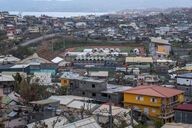
MAYOTTE, cyclone Chido
Michael Bunel / Le Pictorium
LePictorium_0300962.jpg
The military hospital, ESCRIM installed at the Cavani stadium. The complex, designed to accommodate 100 patients per day, is overwhelmed with between 150 and 200 people coming to be consulted per day. December 23, 2024. Mamoudzou.
The island of Mayotte is devastated after the passage of Cyclone Chido which hit the island on December 14. The population of the slums from Comorian immigration, already destitute before the passage of the cyclone, complains of the lack of help. “It’s food and drink that we need”, “we still haven’t seen help” quickly confided women in the heights of the Kaweni slum. Civil society is organizing to compensate for the lack of action by the State on site, which is slow in getting water and food to the entire population. The aid announced by the French government is blocked in Reunion. Firefighters, Red Cross, civil protection, all were offered to go into the field but without their cargo! How to intervene when technical means are not available. On the island, no or little distribution of food and water. When this is the case, it is the locals who become volunteers and who provide a minimum of daily support. Liberal nurses, teachers or simple local residents, all provide their support to take care of those most affected. The only place of refuge after the destruction of the shanty towns by the cyclone, the colleges and schools. In Mamoudzou alone, the capital, 2,000 people are sheltered in establishments. But everything is missing! The principal of a college takes responsibility for purchasing supplies when at the Lycée des Lumières, local residents have just spent 400 euros to be able to obtain rice. In the heights of Mamoudzou, the Kawani slum is already recovering. The resilience of the “banga” population is equal to the disaster. The sound of hammers on metal sheets is omnipresent! The rainy season is underway and finding a roof over your head is a priority!
The island of Mayotte is devastated after the passage of Cyclone Chido which hit the island on December 14. The population of the slums from Comorian immigration, already destitute before the passage of the cyclone, complains of the lack of help. “It’s food and drink that we need”, “we still haven’t seen help” quickly confided women in the heights of the Kaweni slum. Civil society is organizing to compensate for the lack of action by the State on site, which is slow in getting water and food to the entire population. The aid announced by the French government is blocked in Reunion. Firefighters, Red Cross, civil protection, all were offered to go into the field but without their cargo! How to intervene when technical means are not available. On the island, no or little distribution of food and water. When this is the case, it is the locals who become volunteers and who provide a minimum of daily support. Liberal nurses, teachers or simple local residents, all provide their support to take care of those most affected. The only place of refuge after the destruction of the shanty towns by the cyclone, the colleges and schools. In Mamoudzou alone, the capital, 2,000 people are sheltered in establishments. But everything is missing! The principal of a college takes responsibility for purchasing supplies when at the Lycée des Lumières, local residents have just spent 400 euros to be able to obtain rice. In the heights of Mamoudzou, the Kawani slum is already recovering. The resilience of the “banga” population is equal to the disaster. The sound of hammers on metal sheets is omnipresent! The rainy season is underway and finding a roof over your head is a priority!

MAYOTTE, cyclone Chido
Michael Bunel / Le Pictorium
LePictorium_0300963.jpg
Karine, a nurse at the CHM (Mayotte Hospital Center), helps those affected by the cyclone. With several people, they set up a pot to collect money to buy food to distribute in schools, colleges and high schools which have served as accommodation since the cyclone hit the island.
The island of Mayotte is devastated after the passage of Cyclone Chido which hit the island on December 14. The population of the slums from Comorian immigration, already destitute before the passage of the cyclone, complains of the lack of help. “It’s food and drink that we need”, “we still haven’t seen help” quickly confided women in the heights of the Kaweni slum. Civil society is organizing to compensate for the lack of action by the State on site, which is slow in getting water and food to the entire population. The aid announced by the French government is blocked in Reunion. Firefighters, Red Cross, civil protection, all were offered to go into the field but without their cargo! How to intervene when technical means are not available. On the island, no or little distribution of food and water. When this is the case, it is the locals who become volunteers and who provide a minimum of daily support. Liberal nurses, teachers or simple local residents, all provide their support to take care of those most affected. The only place of refuge after the destruction of the shanty towns by the cyclone, the colleges and schools. In Mamoudzou alone, the capital, 2,000 people are sheltered in establishments. But everything is missing! The principal of a college takes responsibility for purchasing supplies when at the Lycée des Lumières, local residents have just spent 400 euros to be able to obtain rice. In the heights of Mamoudzou, the Kawani slum is already recovering. The resilience of the “banga” population is equal to the disaster. The sound of hammers on metal sheets is omnipresent! The rainy season is underway and finding a roof over your head is a priority!
The island of Mayotte is devastated after the passage of Cyclone Chido which hit the island on December 14. The population of the slums from Comorian immigration, already destitute before the passage of the cyclone, complains of the lack of help. “It’s food and drink that we need”, “we still haven’t seen help” quickly confided women in the heights of the Kaweni slum. Civil society is organizing to compensate for the lack of action by the State on site, which is slow in getting water and food to the entire population. The aid announced by the French government is blocked in Reunion. Firefighters, Red Cross, civil protection, all were offered to go into the field but without their cargo! How to intervene when technical means are not available. On the island, no or little distribution of food and water. When this is the case, it is the locals who become volunteers and who provide a minimum of daily support. Liberal nurses, teachers or simple local residents, all provide their support to take care of those most affected. The only place of refuge after the destruction of the shanty towns by the cyclone, the colleges and schools. In Mamoudzou alone, the capital, 2,000 people are sheltered in establishments. But everything is missing! The principal of a college takes responsibility for purchasing supplies when at the Lycée des Lumières, local residents have just spent 400 euros to be able to obtain rice. In the heights of Mamoudzou, the Kawani slum is already recovering. The resilience of the “banga” population is equal to the disaster. The sound of hammers on metal sheets is omnipresent! The rainy season is underway and finding a roof over your head is a priority!
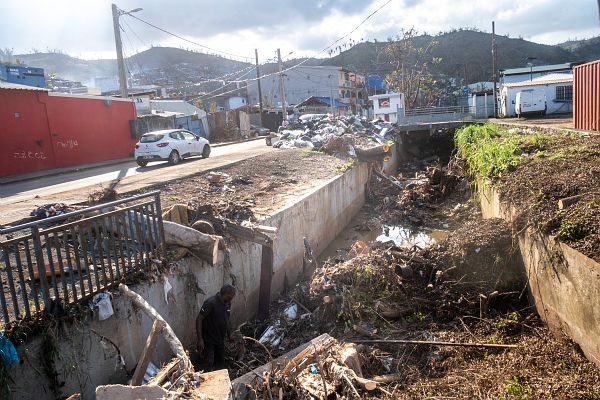
MAYOTTE, cyclone Chido
Michael Bunel / Le Pictorium
LePictorium_0300964.jpg
A man digs through the trash looking for materials he could salvage to rebuild a shelter. The island is devastated after Cyclone Chido hit the island of Mayotte on December 14. The population, already destitute before the cyclone, complained of a lack of relief. December 21, 2024. Mamoudzou, Mayotte.
The island of Mayotte is devastated after the passage of Cyclone Chido which hit the island on December 14. The population of the slums from Comorian immigration, already destitute before the passage of the cyclone, complains of the lack of help. “It’s food and drink that we need”, “we still haven’t seen help” quickly confided women in the heights of the Kaweni slum. Civil society is organizing to compensate for the lack of action by the State on site, which is slow in getting water and food to the entire population. The aid announced by the French government is blocked in Reunion. Firefighters, Red Cross, civil protection, all were offered to go into the field but without their cargo! How to intervene when technical means are not available. On the island, no or little distribution of food and water. When this is the case, it is the locals who become volunteers and who provide a minimum of daily support. Liberal nurses, teachers or simple local residents, all provide their support to take care of those most affected. The only place of refuge after the destruction of the shanty towns by the cyclone, the colleges and schools. In Mamoudzou alone, the capital, 2,000 people are sheltered in establishments. But everything is missing! The principal of a college takes responsibility for purchasing supplies when at the Lycée des Lumières, local residents have just spent 400 euros to be able to obtain rice. In the heights of Mamoudzou, the Kawani slum is already recovering. The resilience of the “banga” population is equal to the disaster. The sound of hammers on metal sheets is omnipresent! The rainy season is underway and finding a roof over your head is a priority!
The island of Mayotte is devastated after the passage of Cyclone Chido which hit the island on December 14. The population of the slums from Comorian immigration, already destitute before the passage of the cyclone, complains of the lack of help. “It’s food and drink that we need”, “we still haven’t seen help” quickly confided women in the heights of the Kaweni slum. Civil society is organizing to compensate for the lack of action by the State on site, which is slow in getting water and food to the entire population. The aid announced by the French government is blocked in Reunion. Firefighters, Red Cross, civil protection, all were offered to go into the field but without their cargo! How to intervene when technical means are not available. On the island, no or little distribution of food and water. When this is the case, it is the locals who become volunteers and who provide a minimum of daily support. Liberal nurses, teachers or simple local residents, all provide their support to take care of those most affected. The only place of refuge after the destruction of the shanty towns by the cyclone, the colleges and schools. In Mamoudzou alone, the capital, 2,000 people are sheltered in establishments. But everything is missing! The principal of a college takes responsibility for purchasing supplies when at the Lycée des Lumières, local residents have just spent 400 euros to be able to obtain rice. In the heights of Mamoudzou, the Kawani slum is already recovering. The resilience of the “banga” population is equal to the disaster. The sound of hammers on metal sheets is omnipresent! The rainy season is underway and finding a roof over your head is a priority!
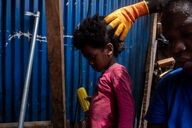
MAYOTTE, cyclone Chido
Michael Bunel / Le Pictorium
LePictorium_0300965.jpg
Alinayanah, 4 years old, suffers from impetis lesion. She lives in the Kaweni slum with her family. His condition requires medication, including antibiotics that the family cannot afford. Kaweni slum. December 20, 2024. Mamoudzou, Mayotte.
The island of Mayotte is devastated after the passage of Cyclone Chido which hit the island on December 14. The population of the slums from Comorian immigration, already destitute before the passage of the cyclone, complains of the lack of help. “It’s food and drink that we need”, “we still haven’t seen help” quickly confided women in the heights of the Kaweni slum. Civil society is organizing to compensate for the lack of action by the State on site, which is slow in getting water and food to the entire population. The aid announced by the French government is blocked in Reunion. Firefighters, Red Cross, civil protection, all were offered to go into the field but without their cargo! How to intervene when technical means are not available. On the island, no or little distribution of food and water. When this is the case, it is the locals who become volunteers and who provide a minimum of daily support. Liberal nurses, teachers or simple local residents, all provide their support to take care of those most affected. The only place of refuge after the destruction of the shanty towns by the cyclone, the colleges and schools. In Mamoudzou alone, the capital, 2,000 people are sheltered in establishments. But everything is missing! The principal of a college takes responsibility for purchasing supplies when at the Lycée des Lumières, local residents have just spent 400 euros to be able to obtain rice. In the heights of Mamoudzou, the Kawani slum is already recovering. The resilience of the “banga” population is equal to the disaster. The sound of hammers on metal sheets is omnipresent! The rainy season is underway and finding a roof over your head is a priority!
The island of Mayotte is devastated after the passage of Cyclone Chido which hit the island on December 14. The population of the slums from Comorian immigration, already destitute before the passage of the cyclone, complains of the lack of help. “It’s food and drink that we need”, “we still haven’t seen help” quickly confided women in the heights of the Kaweni slum. Civil society is organizing to compensate for the lack of action by the State on site, which is slow in getting water and food to the entire population. The aid announced by the French government is blocked in Reunion. Firefighters, Red Cross, civil protection, all were offered to go into the field but without their cargo! How to intervene when technical means are not available. On the island, no or little distribution of food and water. When this is the case, it is the locals who become volunteers and who provide a minimum of daily support. Liberal nurses, teachers or simple local residents, all provide their support to take care of those most affected. The only place of refuge after the destruction of the shanty towns by the cyclone, the colleges and schools. In Mamoudzou alone, the capital, 2,000 people are sheltered in establishments. But everything is missing! The principal of a college takes responsibility for purchasing supplies when at the Lycée des Lumières, local residents have just spent 400 euros to be able to obtain rice. In the heights of Mamoudzou, the Kawani slum is already recovering. The resilience of the “banga” population is equal to the disaster. The sound of hammers on metal sheets is omnipresent! The rainy season is underway and finding a roof over your head is a priority!
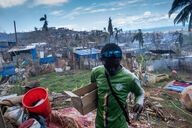
MAYOTTE, cyclone Chido
Michael Bunel / Le Pictorium
LePictorium_0300966.jpg
Ali Combos, 20 years old, distributes tablets for decontaminating water and soap to residents of the Kersoni slum. It helps NGOs to go to the slums in order to facilitate contact with the populations. December 25, 2024. Koungou, Mayotte.
The island of Mayotte is devastated after the passage of Cyclone Chido which hit the island on December 14. The population of the slums from Comorian immigration, already destitute before the passage of the cyclone, complains of the lack of help. “It’s food and drink that we need”, “we still haven’t seen help” quickly confided women in the heights of the Kaweni slum. Civil society is organizing to compensate for the lack of action by the State on site, which is slow in getting water and food to the entire population. The aid announced by the French government is blocked in Reunion. Firefighters, Red Cross, civil protection, all were offered to go into the field but without their cargo! How to intervene when technical means are not available. On the island, no or little distribution of food and water. When this is the case, it is the locals who become volunteers and who provide a minimum of daily support. Liberal nurses, teachers or simple local residents, all provide their support to take care of those most affected. The only place of refuge after the destruction of the shanty towns by the cyclone, the colleges and schools. In Mamoudzou alone, the capital, 2,000 people are sheltered in establishments. But everything is missing! The principal of a college takes responsibility for purchasing supplies when at the Lycée des Lumières, local residents have just spent 400 euros to be able to obtain rice. In the heights of Mamoudzou, the Kawani slum is already recovering. The resilience of the “banga” population is equal to the disaster. The sound of hammers on metal sheets is omnipresent! The rainy season is underway and finding a roof over your head is a priority!
The island of Mayotte is devastated after the passage of Cyclone Chido which hit the island on December 14. The population of the slums from Comorian immigration, already destitute before the passage of the cyclone, complains of the lack of help. “It’s food and drink that we need”, “we still haven’t seen help” quickly confided women in the heights of the Kaweni slum. Civil society is organizing to compensate for the lack of action by the State on site, which is slow in getting water and food to the entire population. The aid announced by the French government is blocked in Reunion. Firefighters, Red Cross, civil protection, all were offered to go into the field but without their cargo! How to intervene when technical means are not available. On the island, no or little distribution of food and water. When this is the case, it is the locals who become volunteers and who provide a minimum of daily support. Liberal nurses, teachers or simple local residents, all provide their support to take care of those most affected. The only place of refuge after the destruction of the shanty towns by the cyclone, the colleges and schools. In Mamoudzou alone, the capital, 2,000 people are sheltered in establishments. But everything is missing! The principal of a college takes responsibility for purchasing supplies when at the Lycée des Lumières, local residents have just spent 400 euros to be able to obtain rice. In the heights of Mamoudzou, the Kawani slum is already recovering. The resilience of the “banga” population is equal to the disaster. The sound of hammers on metal sheets is omnipresent! The rainy season is underway and finding a roof over your head is a priority!
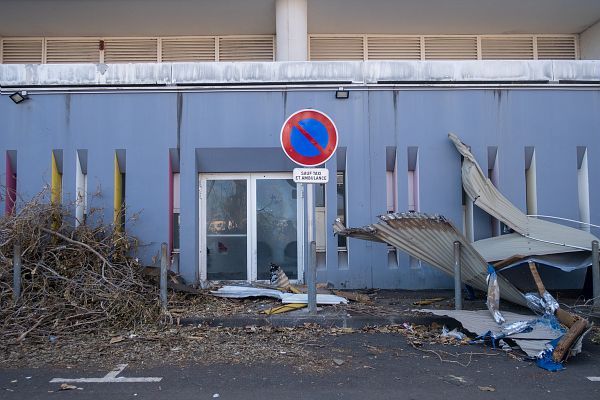
MAYOTTE, cyclone Chido
Michael Bunel / Le Pictorium
LePictorium_0300967.jpg
Several debris lie on the ground and clutter the sidewalks of the CHM (Mayotte Hospital Center). The island is devastated after Cyclone Chido hit the island of Mayotte on December 14. The hospital center was hit hard, particularly the emergency room which lost part of its roof. ESCRIM, the field hospital located in the city, should help relieve congestion at the CHM and allow work to be carried out. December 21, 2024. Mamoudzou, Mayotte.
The island of Mayotte is devastated after the passage of Cyclone Chido which hit the island on December 14. The population of the slums from Comorian immigration, already destitute before the passage of the cyclone, complains of the lack of help. “It’s food and drink that we need”, “we still haven’t seen help” quickly confided women in the heights of the Kaweni slum. Civil society is organizing to compensate for the lack of action by the State on site, which is slow in getting water and food to the entire population. The aid announced by the French government is blocked in Reunion. Firefighters, Red Cross, civil protection, all were offered to go into the field but without their cargo! How to intervene when technical means are not available. On the island, no or little distribution of food and water. When this is the case, it is the locals who become volunteers and who provide a minimum of daily support. Liberal nurses, teachers or simple local residents, all provide their support to take care of those most affected. The only place of refuge after the destruction of the shanty towns by the cyclone, the colleges and schools. In Mamoudzou alone, the capital, 2,000 people are sheltered in establishments. But everything is missing! The principal of a college takes responsibility for purchasing supplies when at the Lycée des Lumières, local residents have just spent 400 euros to be able to obtain rice. In the heights of Mamoudzou, the Kawani slum is already recovering. The resilience of the “banga” population is equal to the disaster. The sound of hammers on metal sheets is omnipresent! The rainy season is underway and finding a roof over your head is a priority!
The island of Mayotte is devastated after the passage of Cyclone Chido which hit the island on December 14. The population of the slums from Comorian immigration, already destitute before the passage of the cyclone, complains of the lack of help. “It’s food and drink that we need”, “we still haven’t seen help” quickly confided women in the heights of the Kaweni slum. Civil society is organizing to compensate for the lack of action by the State on site, which is slow in getting water and food to the entire population. The aid announced by the French government is blocked in Reunion. Firefighters, Red Cross, civil protection, all were offered to go into the field but without their cargo! How to intervene when technical means are not available. On the island, no or little distribution of food and water. When this is the case, it is the locals who become volunteers and who provide a minimum of daily support. Liberal nurses, teachers or simple local residents, all provide their support to take care of those most affected. The only place of refuge after the destruction of the shanty towns by the cyclone, the colleges and schools. In Mamoudzou alone, the capital, 2,000 people are sheltered in establishments. But everything is missing! The principal of a college takes responsibility for purchasing supplies when at the Lycée des Lumières, local residents have just spent 400 euros to be able to obtain rice. In the heights of Mamoudzou, the Kawani slum is already recovering. The resilience of the “banga” population is equal to the disaster. The sound of hammers on metal sheets is omnipresent! The rainy season is underway and finding a roof over your head is a priority!
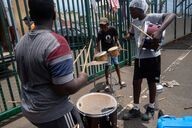
MAYOTTE, cyclone Chido
Michael Bunel / Le Pictorium
LePictorium_0300968.jpg
In the K2 school course, children play with objects in classrooms. Volunteers are trying to move equipment from the middle school to Les Lumières high school before it is looted. It is also a way of keeping children busy who have nothing to do all day and are running around in emergency accommodation centers such as schools, colleges and high schools. December 21, 2024. Mamoudzou, Mayotte.
The island of Mayotte is devastated after the passage of Cyclone Chido which hit the island on December 14. The population of the slums from Comorian immigration, already destitute before the passage of the cyclone, complains of the lack of help. “It’s food and drink that we need”, “we still haven’t seen help” quickly confided women in the heights of the Kaweni slum. Civil society is organizing to compensate for the lack of action by the State on site, which is slow in getting water and food to the entire population. The aid announced by the French government is blocked in Reunion. Firefighters, Red Cross, civil protection, all were offered to go into the field but without their cargo! How to intervene when technical means are not available. On the island, no or little distribution of food and water. When this is the case, it is the locals who become volunteers and who provide a minimum of daily support. Liberal nurses, teachers or simple local residents, all provide their support to take care of those most affected. The only place of refuge after the destruction of the shanty towns by the cyclone, the colleges and schools. In Mamoudzou alone, the capital, 2,000 people are sheltered in establishments. But everything is missing! The principal of a college takes responsibility for purchasing supplies when at the Lycée des Lumières, local residents have just spent 400 euros to be able to obtain rice. In the heights of Mamoudzou, the Kawani slum is already recovering. The resilience of the “banga” population is equal to the disaster. The sound of hammers on metal sheets is omnipresent! The rainy season is underway and finding a roof over your head is a priority!
The island of Mayotte is devastated after the passage of Cyclone Chido which hit the island on December 14. The population of the slums from Comorian immigration, already destitute before the passage of the cyclone, complains of the lack of help. “It’s food and drink that we need”, “we still haven’t seen help” quickly confided women in the heights of the Kaweni slum. Civil society is organizing to compensate for the lack of action by the State on site, which is slow in getting water and food to the entire population. The aid announced by the French government is blocked in Reunion. Firefighters, Red Cross, civil protection, all were offered to go into the field but without their cargo! How to intervene when technical means are not available. On the island, no or little distribution of food and water. When this is the case, it is the locals who become volunteers and who provide a minimum of daily support. Liberal nurses, teachers or simple local residents, all provide their support to take care of those most affected. The only place of refuge after the destruction of the shanty towns by the cyclone, the colleges and schools. In Mamoudzou alone, the capital, 2,000 people are sheltered in establishments. But everything is missing! The principal of a college takes responsibility for purchasing supplies when at the Lycée des Lumières, local residents have just spent 400 euros to be able to obtain rice. In the heights of Mamoudzou, the Kawani slum is already recovering. The resilience of the “banga” population is equal to the disaster. The sound of hammers on metal sheets is omnipresent! The rainy season is underway and finding a roof over your head is a priority!
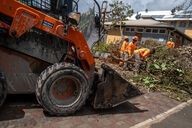
MAYOTTE, cyclone Chido
Michael Bunel / Le Pictorium
LePictorium_0300969.jpg
The technical services of the town of Mamoudzou clear fallen trees on the grounds of the LPO school. December 24, 2024. Mamoudzou, Mayotte.
The island of Mayotte is devastated after the passage of Cyclone Chido which hit the island on December 14. The population of the slums from Comorian immigration, already destitute before the passage of the cyclone, complains of the lack of help. “It’s food and drink that we need”, “we still haven’t seen help” quickly confided women in the heights of the Kaweni slum. Civil society is organizing to compensate for the lack of action by the State on site, which is slow in getting water and food to the entire population. The aid announced by the French government is blocked in Reunion. Firefighters, Red Cross, civil protection, all were offered to go into the field but without their cargo! How to intervene when technical means are not available. On the island, no or little distribution of food and water. When this is the case, it is the locals who become volunteers and who provide a minimum of daily support. Liberal nurses, teachers or simple local residents, all provide their support to take care of those most affected. The only place of refuge after the destruction of the shanty towns by the cyclone, the colleges and schools. In Mamoudzou alone, the capital, 2,000 people are sheltered in establishments. But everything is missing! The principal of a college takes responsibility for purchasing supplies when at the Lycée des Lumières, local residents have just spent 400 euros to be able to obtain rice. In the heights of Mamoudzou, the Kawani slum is already recovering. The resilience of the “banga” population is equal to the disaster. The sound of hammers on metal sheets is omnipresent! The rainy season is underway and finding a roof over your head is a priority!
The island of Mayotte is devastated after the passage of Cyclone Chido which hit the island on December 14. The population of the slums from Comorian immigration, already destitute before the passage of the cyclone, complains of the lack of help. “It’s food and drink that we need”, “we still haven’t seen help” quickly confided women in the heights of the Kaweni slum. Civil society is organizing to compensate for the lack of action by the State on site, which is slow in getting water and food to the entire population. The aid announced by the French government is blocked in Reunion. Firefighters, Red Cross, civil protection, all were offered to go into the field but without their cargo! How to intervene when technical means are not available. On the island, no or little distribution of food and water. When this is the case, it is the locals who become volunteers and who provide a minimum of daily support. Liberal nurses, teachers or simple local residents, all provide their support to take care of those most affected. The only place of refuge after the destruction of the shanty towns by the cyclone, the colleges and schools. In Mamoudzou alone, the capital, 2,000 people are sheltered in establishments. But everything is missing! The principal of a college takes responsibility for purchasing supplies when at the Lycée des Lumières, local residents have just spent 400 euros to be able to obtain rice. In the heights of Mamoudzou, the Kawani slum is already recovering. The resilience of the “banga” population is equal to the disaster. The sound of hammers on metal sheets is omnipresent! The rainy season is underway and finding a roof over your head is a priority!
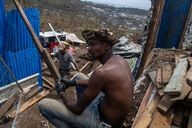
MAYOTTE, cyclone Chido
Michael Bunel / Le Pictorium
LePictorium_0300970.jpg
Abdellah and his father on the heights of the Kaweni slum. They are rebuilding Abdellah's house which was destroyed by the cyclone. He, his wife and their child owe their survival to a door that he held above their heads and which protected them from the debris that fell on them. He says there have been many deaths in the slum but no one wants to talk about it. December 23, 2024. Mamoudzou, Mayotte.
The island of Mayotte is devastated after the passage of Cyclone Chido which hit the island on December 14. The population of the slums from Comorian immigration, already destitute before the passage of the cyclone, complains of the lack of help. “It’s food and drink that we need”, “we still haven’t seen help” quickly confided women in the heights of the Kaweni slum. Civil society is organizing to compensate for the lack of action by the State on site, which is slow in getting water and food to the entire population. The aid announced by the French government is blocked in Reunion. Firefighters, Red Cross, civil protection, all were offered to go into the field but without their cargo! How to intervene when technical means are not available. On the island, no or little distribution of food and water. When this is the case, it is the locals who become volunteers and who provide a minimum of daily support. Liberal nurses, teachers or simple local residents, all provide their support to take care of those most affected. The only place of refuge after the destruction of the shanty towns by the cyclone, the colleges and schools. In Mamoudzou alone, the capital, 2,000 people are sheltered in establishments. But everything is missing! The principal of a college takes responsibility for purchasing supplies when at the Lycée des Lumières, local residents have just spent 400 euros to be able to obtain rice. In the heights of Mamoudzou, the Kawani slum is already recovering. The resilience of the “banga” population is equal to the disaster. The sound of hammers on metal sheets is omnipresent! The rainy season is underway and finding a roof over your head is a priority!
The island of Mayotte is devastated after the passage of Cyclone Chido which hit the island on December 14. The population of the slums from Comorian immigration, already destitute before the passage of the cyclone, complains of the lack of help. “It’s food and drink that we need”, “we still haven’t seen help” quickly confided women in the heights of the Kaweni slum. Civil society is organizing to compensate for the lack of action by the State on site, which is slow in getting water and food to the entire population. The aid announced by the French government is blocked in Reunion. Firefighters, Red Cross, civil protection, all were offered to go into the field but without their cargo! How to intervene when technical means are not available. On the island, no or little distribution of food and water. When this is the case, it is the locals who become volunteers and who provide a minimum of daily support. Liberal nurses, teachers or simple local residents, all provide their support to take care of those most affected. The only place of refuge after the destruction of the shanty towns by the cyclone, the colleges and schools. In Mamoudzou alone, the capital, 2,000 people are sheltered in establishments. But everything is missing! The principal of a college takes responsibility for purchasing supplies when at the Lycée des Lumières, local residents have just spent 400 euros to be able to obtain rice. In the heights of Mamoudzou, the Kawani slum is already recovering. The resilience of the “banga” population is equal to the disaster. The sound of hammers on metal sheets is omnipresent! The rainy season is underway and finding a roof over your head is a priority!
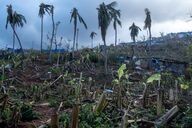
MAYOTTE, cyclone Chido
Michael Bunel / Le Pictorium
LePictorium_0300971.jpg
In the Kersoni slum, as throughout the island, banana trees and other trees were destroyed by the cyclone. The houses are being rebuilt, the -bangas-, made of sheet metal and wood. The inhabitants of the slums no longer benefit from the shade of the trees and suffer even more from the intense heat. The coconut and banana trees will not bear fruit for 5 years, leaving the inhabitants who were used to eating the fruits of these trees a little more destitute. December 25, 2024. Koungou, Mayotte.
The island of Mayotte is devastated after the passage of Cyclone Chido which hit the island on December 14. The population of the slums from Comorian immigration, already destitute before the passage of the cyclone, complains of the lack of help. “It’s food and drink that we need”, “we still haven’t seen help” quickly confided women in the heights of the Kaweni slum. Civil society is organizing to compensate for the lack of action by the State on site, which is slow in getting water and food to the entire population. The aid announced by the French government is blocked in Reunion. Firefighters, Red Cross, civil protection, all were offered to go into the field but without their cargo! How to intervene when technical means are not available. On the island, no or little distribution of food and water. When this is the case, it is the locals who become volunteers and who provide a minimum of daily support. Liberal nurses, teachers or simple local residents, all provide their support to take care of those most affected. The only place of refuge after the destruction of the shanty towns by the cyclone, the colleges and schools. In Mamoudzou alone, the capital, 2,000 people are sheltered in establishments. But everything is missing! The principal of a college takes responsibility for purchasing supplies when at the Lycée des Lumières, local residents have just spent 400 euros to be able to obtain rice. In the heights of Mamoudzou, the Kawani slum is already recovering. The resilience of the “banga” population is equal to the disaster. The sound of hammers on metal sheets is omnipresent! The rainy season is underway and finding a roof over your head is a priority!
The island of Mayotte is devastated after the passage of Cyclone Chido which hit the island on December 14. The population of the slums from Comorian immigration, already destitute before the passage of the cyclone, complains of the lack of help. “It’s food and drink that we need”, “we still haven’t seen help” quickly confided women in the heights of the Kaweni slum. Civil society is organizing to compensate for the lack of action by the State on site, which is slow in getting water and food to the entire population. The aid announced by the French government is blocked in Reunion. Firefighters, Red Cross, civil protection, all were offered to go into the field but without their cargo! How to intervene when technical means are not available. On the island, no or little distribution of food and water. When this is the case, it is the locals who become volunteers and who provide a minimum of daily support. Liberal nurses, teachers or simple local residents, all provide their support to take care of those most affected. The only place of refuge after the destruction of the shanty towns by the cyclone, the colleges and schools. In Mamoudzou alone, the capital, 2,000 people are sheltered in establishments. But everything is missing! The principal of a college takes responsibility for purchasing supplies when at the Lycée des Lumières, local residents have just spent 400 euros to be able to obtain rice. In the heights of Mamoudzou, the Kawani slum is already recovering. The resilience of the “banga” population is equal to the disaster. The sound of hammers on metal sheets is omnipresent! The rainy season is underway and finding a roof over your head is a priority!
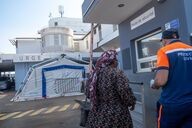
MAYOTTE, cyclone Chido
Michael Bunel / Le Pictorium
LePictorium_0300972.jpg
Nil, 35, a private nurse in Mayotte, takes an 8-month pregnant and diabetic woman to the Mayotte hospital. Originally from Rennes, Nil had returned to mainland France when the cyclone hit Mayotte. He became involved in civil protection as a volunteer to be able to reach Mayotte and come to the aid of the affected population. December 21, 2024. Mamoudzou, Mayotte, France.
The island of Mayotte is devastated after the passage of Cyclone Chido which hit the island on December 14. The population of the slums from Comorian immigration, already destitute before the passage of the cyclone, complains of the lack of help. “It’s food and drink that we need”, “we still haven’t seen help” quickly confided women in the heights of the Kaweni slum. Civil society is organizing to compensate for the lack of action by the State on site, which is slow in getting water and food to the entire population. The aid announced by the French government is blocked in Reunion. Firefighters, Red Cross, civil protection, all were offered to go into the field but without their cargo! How to intervene when technical means are not available. On the island, no or little distribution of food and water. When this is the case, it is the locals who become volunteers and who provide a minimum of daily support. Liberal nurses, teachers or simple local residents, all provide their support to take care of those most affected. The only place of refuge after the destruction of the shanty towns by the cyclone, the colleges and schools. In Mamoudzou alone, the capital, 2,000 people are sheltered in establishments. But everything is missing! The principal of a college takes responsibility for purchasing supplies when at the Lycée des Lumières, local residents have just spent 400 euros to be able to obtain rice. In the heights of Mamoudzou, the Kawani slum is already recovering. The resilience of the “banga” population is equal to the disaster. The sound of hammers on metal sheets is omnipresent! The rainy season is underway and finding a roof over your head is a priority!
The island of Mayotte is devastated after the passage of Cyclone Chido which hit the island on December 14. The population of the slums from Comorian immigration, already destitute before the passage of the cyclone, complains of the lack of help. “It’s food and drink that we need”, “we still haven’t seen help” quickly confided women in the heights of the Kaweni slum. Civil society is organizing to compensate for the lack of action by the State on site, which is slow in getting water and food to the entire population. The aid announced by the French government is blocked in Reunion. Firefighters, Red Cross, civil protection, all were offered to go into the field but without their cargo! How to intervene when technical means are not available. On the island, no or little distribution of food and water. When this is the case, it is the locals who become volunteers and who provide a minimum of daily support. Liberal nurses, teachers or simple local residents, all provide their support to take care of those most affected. The only place of refuge after the destruction of the shanty towns by the cyclone, the colleges and schools. In Mamoudzou alone, the capital, 2,000 people are sheltered in establishments. But everything is missing! The principal of a college takes responsibility for purchasing supplies when at the Lycée des Lumières, local residents have just spent 400 euros to be able to obtain rice. In the heights of Mamoudzou, the Kawani slum is already recovering. The resilience of the “banga” population is equal to the disaster. The sound of hammers on metal sheets is omnipresent! The rainy season is underway and finding a roof over your head is a priority!
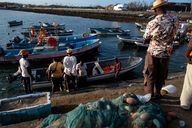
MAYOTTE, cyclone Chido
Michael Bunel / Le Pictorium
LePictorium_0300973.jpg
Fishermen return to land after a day of work at sea. The fishing is meager, says one of the men who are looking at the loot brought back. December 23, 2024. Labattoir, Petite Terre, Mayotte.
The island of Mayotte is devastated after the passage of Cyclone Chido which hit the island on December 14. The population of the slums from Comorian immigration, already destitute before the passage of the cyclone, complains of the lack of help. “It’s food and drink that we need”, “we still haven’t seen help” quickly confided women in the heights of the Kaweni slum. Civil society is organizing to compensate for the lack of action by the State on site, which is slow in getting water and food to the entire population. The aid announced by the French government is blocked in Reunion. Firefighters, Red Cross, civil protection, all were offered to go into the field but without their cargo! How to intervene when technical means are not available. On the island, no or little distribution of food and water. When this is the case, it is the locals who become volunteers and who provide a minimum of daily support. Liberal nurses, teachers or simple local residents, all provide their support to take care of those most affected. The only place of refuge after the destruction of the shanty towns by the cyclone, the colleges and schools. In Mamoudzou alone, the capital, 2,000 people are sheltered in establishments. But everything is missing! The principal of a college takes responsibility for purchasing supplies when at the Lycée des Lumières, local residents have just spent 400 euros to be able to obtain rice. In the heights of Mamoudzou, the Kawani slum is already recovering. The resilience of the “banga” population is equal to the disaster. The sound of hammers on metal sheets is omnipresent! The rainy season is underway and finding a roof over your head is a priority!
The island of Mayotte is devastated after the passage of Cyclone Chido which hit the island on December 14. The population of the slums from Comorian immigration, already destitute before the passage of the cyclone, complains of the lack of help. “It’s food and drink that we need”, “we still haven’t seen help” quickly confided women in the heights of the Kaweni slum. Civil society is organizing to compensate for the lack of action by the State on site, which is slow in getting water and food to the entire population. The aid announced by the French government is blocked in Reunion. Firefighters, Red Cross, civil protection, all were offered to go into the field but without their cargo! How to intervene when technical means are not available. On the island, no or little distribution of food and water. When this is the case, it is the locals who become volunteers and who provide a minimum of daily support. Liberal nurses, teachers or simple local residents, all provide their support to take care of those most affected. The only place of refuge after the destruction of the shanty towns by the cyclone, the colleges and schools. In Mamoudzou alone, the capital, 2,000 people are sheltered in establishments. But everything is missing! The principal of a college takes responsibility for purchasing supplies when at the Lycée des Lumières, local residents have just spent 400 euros to be able to obtain rice. In the heights of Mamoudzou, the Kawani slum is already recovering. The resilience of the “banga” population is equal to the disaster. The sound of hammers on metal sheets is omnipresent! The rainy season is underway and finding a roof over your head is a priority!
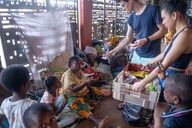
MAYOTTE, cyclone Chido
Michael Bunel / Le Pictorium
LePictorium_0300974.jpg
Volunteers distribute some food to people who have found shelter at the Lycée des Lumières. The establishment serves as a refuge for 600 people who have lost their living quarters. The food distributed was purchased by volunteers. December 21, 2024. Mamoudzou, Mayotte.
The island of Mayotte is devastated after the passage of Cyclone Chido which hit the island on December 14. The population of the slums from Comorian immigration, already destitute before the passage of the cyclone, complains of the lack of help. “It’s food and drink that we need”, “we still haven’t seen help” quickly confided women in the heights of the Kaweni slum. Civil society is organizing to compensate for the lack of action by the State on site, which is slow in getting water and food to the entire population. The aid announced by the French government is blocked in Reunion. Firefighters, Red Cross, civil protection, all were offered to go into the field but without their cargo! How to intervene when technical means are not available. On the island, no or little distribution of food and water. When this is the case, it is the locals who become volunteers and who provide a minimum of daily support. Liberal nurses, teachers or simple local residents, all provide their support to take care of those most affected. The only place of refuge after the destruction of the shanty towns by the cyclone, the colleges and schools. In Mamoudzou alone, the capital, 2,000 people are sheltered in establishments. But everything is missing! The principal of a college takes responsibility for purchasing supplies when at the Lycée des Lumières, local residents have just spent 400 euros to be able to obtain rice. In the heights of Mamoudzou, the Kawani slum is already recovering. The resilience of the “banga” population is equal to the disaster. The sound of hammers on metal sheets is omnipresent! The rainy season is underway and finding a roof over your head is a priority!
The island of Mayotte is devastated after the passage of Cyclone Chido which hit the island on December 14. The population of the slums from Comorian immigration, already destitute before the passage of the cyclone, complains of the lack of help. “It’s food and drink that we need”, “we still haven’t seen help” quickly confided women in the heights of the Kaweni slum. Civil society is organizing to compensate for the lack of action by the State on site, which is slow in getting water and food to the entire population. The aid announced by the French government is blocked in Reunion. Firefighters, Red Cross, civil protection, all were offered to go into the field but without their cargo! How to intervene when technical means are not available. On the island, no or little distribution of food and water. When this is the case, it is the locals who become volunteers and who provide a minimum of daily support. Liberal nurses, teachers or simple local residents, all provide their support to take care of those most affected. The only place of refuge after the destruction of the shanty towns by the cyclone, the colleges and schools. In Mamoudzou alone, the capital, 2,000 people are sheltered in establishments. But everything is missing! The principal of a college takes responsibility for purchasing supplies when at the Lycée des Lumières, local residents have just spent 400 euros to be able to obtain rice. In the heights of Mamoudzou, the Kawani slum is already recovering. The resilience of the “banga” population is equal to the disaster. The sound of hammers on metal sheets is omnipresent! The rainy season is underway and finding a roof over your head is a priority!
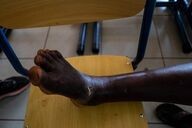
MAYOTTE, cyclone Chido
Michael Bunel / Le Pictorium
LePictorium_0300975.jpg
A man comes to have his wound treated in one of the dispensaries opened by civil protection in the Koungou nursery school. Many people suffer from infected wounds. The Comorian population tends to avoid the Mayotte hospital for fear of being arrested by the PAF (border police) and then being sent back to the Comoros. December 23, 2024. Mamoudzou, Mayotte.
The island of Mayotte is devastated after the passage of Cyclone Chido which hit the island on December 14. The population of the slums from Comorian immigration, already destitute before the passage of the cyclone, complains of the lack of help. “It’s food and drink that we need”, “we still haven’t seen help” quickly confided women in the heights of the Kaweni slum. Civil society is organizing to compensate for the lack of action by the State on site, which is slow in getting water and food to the entire population. The aid announced by the French government is blocked in Reunion. Firefighters, Red Cross, civil protection, all were offered to go into the field but without their cargo! How to intervene when technical means are not available. On the island, no or little distribution of food and water. When this is the case, it is the locals who become volunteers and who provide a minimum of daily support. Liberal nurses, teachers or simple local residents, all provide their support to take care of those most affected. The only place of refuge after the destruction of the shanty towns by the cyclone, the colleges and schools. In Mamoudzou alone, the capital, 2,000 people are sheltered in establishments. But everything is missing! The principal of a college takes responsibility for purchasing supplies when at the Lycée des Lumières, local residents have just spent 400 euros to be able to obtain rice. In the heights of Mamoudzou, the Kawani slum is already recovering. The resilience of the “banga” population is equal to the disaster. The sound of hammers on metal sheets is omnipresent! The rainy season is underway and finding a roof over your head is a priority!
The island of Mayotte is devastated after the passage of Cyclone Chido which hit the island on December 14. The population of the slums from Comorian immigration, already destitute before the passage of the cyclone, complains of the lack of help. “It’s food and drink that we need”, “we still haven’t seen help” quickly confided women in the heights of the Kaweni slum. Civil society is organizing to compensate for the lack of action by the State on site, which is slow in getting water and food to the entire population. The aid announced by the French government is blocked in Reunion. Firefighters, Red Cross, civil protection, all were offered to go into the field but without their cargo! How to intervene when technical means are not available. On the island, no or little distribution of food and water. When this is the case, it is the locals who become volunteers and who provide a minimum of daily support. Liberal nurses, teachers or simple local residents, all provide their support to take care of those most affected. The only place of refuge after the destruction of the shanty towns by the cyclone, the colleges and schools. In Mamoudzou alone, the capital, 2,000 people are sheltered in establishments. But everything is missing! The principal of a college takes responsibility for purchasing supplies when at the Lycée des Lumières, local residents have just spent 400 euros to be able to obtain rice. In the heights of Mamoudzou, the Kawani slum is already recovering. The resilience of the “banga” population is equal to the disaster. The sound of hammers on metal sheets is omnipresent! The rainy season is underway and finding a roof over your head is a priority!
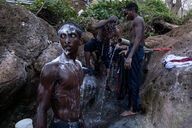
MAYOTTE, cyclone Chido
Michael Bunel / Le Pictorium
LePictorium_0300976.jpg
Three men wash at a water point that flows from the hill where the Kersoni shantytown is located. The water is unfit for consumption. December 25, 2024. Koungou, Mayotte.
The island of Mayotte is devastated after the passage of Cyclone Chido which hit the island on December 14. The population of the slums from Comorian immigration, already destitute before the passage of the cyclone, complains of the lack of help. “It’s food and drink that we need”, “we still haven’t seen help” quickly confided women in the heights of the Kaweni slum. Civil society is organizing to compensate for the lack of action by the State on site, which is slow in getting water and food to the entire population. The aid announced by the French government is blocked in Reunion. Firefighters, Red Cross, civil protection, all were offered to go into the field but without their cargo! How to intervene when technical means are not available. On the island, no or little distribution of food and water. When this is the case, it is the locals who become volunteers and who provide a minimum of daily support. Liberal nurses, teachers or simple local residents, all provide their support to take care of those most affected. The only place of refuge after the destruction of the shanty towns by the cyclone, the colleges and schools. In Mamoudzou alone, the capital, 2,000 people are sheltered in establishments. But everything is missing! The principal of a college takes responsibility for purchasing supplies when at the Lycée des Lumières, local residents have just spent 400 euros to be able to obtain rice. In the heights of Mamoudzou, the Kawani slum is already recovering. The resilience of the “banga” population is equal to the disaster. The sound of hammers on metal sheets is omnipresent! The rainy season is underway and finding a roof over your head is a priority!
The island of Mayotte is devastated after the passage of Cyclone Chido which hit the island on December 14. The population of the slums from Comorian immigration, already destitute before the passage of the cyclone, complains of the lack of help. “It’s food and drink that we need”, “we still haven’t seen help” quickly confided women in the heights of the Kaweni slum. Civil society is organizing to compensate for the lack of action by the State on site, which is slow in getting water and food to the entire population. The aid announced by the French government is blocked in Reunion. Firefighters, Red Cross, civil protection, all were offered to go into the field but without their cargo! How to intervene when technical means are not available. On the island, no or little distribution of food and water. When this is the case, it is the locals who become volunteers and who provide a minimum of daily support. Liberal nurses, teachers or simple local residents, all provide their support to take care of those most affected. The only place of refuge after the destruction of the shanty towns by the cyclone, the colleges and schools. In Mamoudzou alone, the capital, 2,000 people are sheltered in establishments. But everything is missing! The principal of a college takes responsibility for purchasing supplies when at the Lycée des Lumières, local residents have just spent 400 euros to be able to obtain rice. In the heights of Mamoudzou, the Kawani slum is already recovering. The resilience of the “banga” population is equal to the disaster. The sound of hammers on metal sheets is omnipresent! The rainy season is underway and finding a roof over your head is a priority!
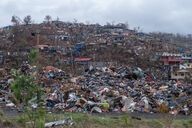
MAYOTTE, cyclone Chido
Michael Bunel / Le Pictorium
LePictorium_0300977.jpg
“Le Remblais M’tsapéré”, a waste storage area, is an old mangrove swamp. Originally, the area was being developed to create a bus. The goal was to relieve traffic congestion, which is extremely important in Mayotte. With the cyclone, the place became an open-air dump where various debris collected in the city by garbage collectors piled up. December 23, 2024. M’Tsapéré, Mayotte.
The island of Mayotte is devastated after the passage of Cyclone Chido which hit the island on December 14. The population of the slums from Comorian immigration, already destitute before the passage of the cyclone, complains of the lack of help. “It’s food and drink that we need”, “we still haven’t seen help” quickly confided women in the heights of the Kaweni slum. Civil society is organizing to compensate for the lack of action by the State on site, which is slow in getting water and food to the entire population. The aid announced by the French government is blocked in Reunion. Firefighters, Red Cross, civil protection, all were offered to go into the field but without their cargo! How to intervene when technical means are not available. On the island, no or little distribution of food and water. When this is the case, it is the locals who become volunteers and who provide a minimum of daily support. Liberal nurses, teachers or simple local residents, all provide their support to take care of those most affected. The only place of refuge after the destruction of the shanty towns by the cyclone, the colleges and schools. In Mamoudzou alone, the capital, 2,000 people are sheltered in establishments. But everything is missing! The principal of a college takes responsibility for purchasing supplies when at the Lycée des Lumières, local residents have just spent 400 euros to be able to obtain rice. In the heights of Mamoudzou, the Kawani slum is already recovering. The resilience of the “banga” population is equal to the disaster. The sound of hammers on metal sheets is omnipresent! The rainy season is underway and finding a roof over your head is a priority!
The island of Mayotte is devastated after the passage of Cyclone Chido which hit the island on December 14. The population of the slums from Comorian immigration, already destitute before the passage of the cyclone, complains of the lack of help. “It’s food and drink that we need”, “we still haven’t seen help” quickly confided women in the heights of the Kaweni slum. Civil society is organizing to compensate for the lack of action by the State on site, which is slow in getting water and food to the entire population. The aid announced by the French government is blocked in Reunion. Firefighters, Red Cross, civil protection, all were offered to go into the field but without their cargo! How to intervene when technical means are not available. On the island, no or little distribution of food and water. When this is the case, it is the locals who become volunteers and who provide a minimum of daily support. Liberal nurses, teachers or simple local residents, all provide their support to take care of those most affected. The only place of refuge after the destruction of the shanty towns by the cyclone, the colleges and schools. In Mamoudzou alone, the capital, 2,000 people are sheltered in establishments. But everything is missing! The principal of a college takes responsibility for purchasing supplies when at the Lycée des Lumières, local residents have just spent 400 euros to be able to obtain rice. In the heights of Mamoudzou, the Kawani slum is already recovering. The resilience of the “banga” population is equal to the disaster. The sound of hammers on metal sheets is omnipresent! The rainy season is underway and finding a roof over your head is a priority!
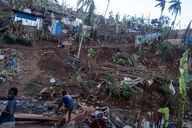
MAYOTTE, cyclone Chido
Michael Bunel / Le Pictorium
LePictorium_0300978.jpg
In the Kersoni slum, a man chains up a tree to obtain wooden planks which will be used to rebuild “Bangas”. December 25, 2024. Koungou, Mayotte.
The island of Mayotte is devastated after the passage of Cyclone Chido which hit the island on December 14. The population of the slums from Comorian immigration, already destitute before the passage of the cyclone, complains of the lack of help. “It’s food and drink that we need”, “we still haven’t seen help” quickly confided women in the heights of the Kaweni slum. Civil society is organizing to compensate for the lack of action by the State on site, which is slow in getting water and food to the entire population. The aid announced by the French government is blocked in Reunion. Firefighters, Red Cross, civil protection, all were offered to go into the field but without their cargo! How to intervene when technical means are not available. On the island, no or little distribution of food and water. When this is the case, it is the locals who become volunteers and who provide a minimum of daily support. Liberal nurses, teachers or simple local residents, all provide their support to take care of those most affected. The only place of refuge after the destruction of the shanty towns by the cyclone, the colleges and schools. In Mamoudzou alone, the capital, 2,000 people are sheltered in establishments. But everything is missing! The principal of a college takes responsibility for purchasing supplies when at the Lycée des Lumières, local residents have just spent 400 euros to be able to obtain rice. In the heights of Mamoudzou, the Kawani slum is already recovering. The resilience of the “banga” population is equal to the disaster. The sound of hammers on metal sheets is omnipresent! The rainy season is underway and finding a roof over your head is a priority!
The island of Mayotte is devastated after the passage of Cyclone Chido which hit the island on December 14. The population of the slums from Comorian immigration, already destitute before the passage of the cyclone, complains of the lack of help. “It’s food and drink that we need”, “we still haven’t seen help” quickly confided women in the heights of the Kaweni slum. Civil society is organizing to compensate for the lack of action by the State on site, which is slow in getting water and food to the entire population. The aid announced by the French government is blocked in Reunion. Firefighters, Red Cross, civil protection, all were offered to go into the field but without their cargo! How to intervene when technical means are not available. On the island, no or little distribution of food and water. When this is the case, it is the locals who become volunteers and who provide a minimum of daily support. Liberal nurses, teachers or simple local residents, all provide their support to take care of those most affected. The only place of refuge after the destruction of the shanty towns by the cyclone, the colleges and schools. In Mamoudzou alone, the capital, 2,000 people are sheltered in establishments. But everything is missing! The principal of a college takes responsibility for purchasing supplies when at the Lycée des Lumières, local residents have just spent 400 euros to be able to obtain rice. In the heights of Mamoudzou, the Kawani slum is already recovering. The resilience of the “banga” population is equal to the disaster. The sound of hammers on metal sheets is omnipresent! The rainy season is underway and finding a roof over your head is a priority!
Next page
